Swami Vivekananda and His 1893 Speech
Photo of Swami Vivekananda in Chicago in 1893 with the handwritten words “one infinite pure and holy—beyond thought beyond qualities I bow down to thee”
Swami Vivekananda (1863–1902) is best known in the United States for his groundbreaking speech to the 1893 World’s Parliament of Religions in which he introduced Hinduism to America and called for religious tolerance and an end to fanaticism. Born Narendranath Dutta, he was the chief disciple of the 19th-century mystic Ramakrishna and the founder of Ramakrishna Mission. Swami Vivekananda is also considered a key figure in the introduction of Vedanta and Yoga to the West and is credited with raising the profile of Hinduism to that of a world religion.
Speech delivered by Swami Vivekananda on September 11, 1893, at the first World’s Parliament of Religions on the site of the present-day Art Institute
Sisters and Brothers of America,
It fills my heart with joy unspeakable to rise in response to the warm and cordial welcome which you have given us. I thank you in the name of the most ancient order of monks in the world, I thank you in the name of the mother of religions, and I thank you in the name of millions and millions of Hindu people of all classes and sects.
My thanks, also, to some of the speakers on this platform who, referring to the delegates from the Orient, have told you that these men from far-off nations may well claim the honor of bearing to different lands the idea of toleration. I am proud to belong to a religion which has taught the world both tolerance and universal acceptance. We believe not only in universal toleration, but we accept all religions as true. I am proud to belong to a nation which has sheltered the persecuted and the refugees of all religions and all nations of the earth. I am proud to tell you that we have gathered in our bosom the purest remnant of the Israelites, who came to Southern India and took refuge with us in the very year in which their holy temple was shattered to pieces by Roman tyranny. I am proud to belong to the religion which has sheltered and is still fostering the remnant of the grand Zoroastrian nation. I will quote to you, brethren, a few lines from a hymn which I remember to have repeated from my earliest boyhood, which is every day repeated by millions of human beings: “As the different streams having their sources in different paths which men take through different tendencies, various though they appear, crooked or straight, all lead to Thee.”
The present convention, which is one of the most august assemblies ever held, is in itself a vindication, a declaration to the world of the wonderful doctrine preached in the Gita: “Whosoever comes to Me, through whatsoever form, I reach him; all men are struggling through paths which in the end lead to me.” Sectarianism, bigotry, and its horrible descendant, fanaticism, have long possessed this beautiful earth. They have filled the earth with violence, drenched it often and often with human blood, destroyed civilization and sent whole nations to despair. Had it not been for these horrible demons, human society would be far more advanced than it is now. But their time is come; and I fervently hope that the bell that tolled this morning in honor of this convention may be the death-knell of all fanaticism, of all persecutions with the sword or with the pen, and of all uncharitable feelings between persons wending their way to the same goal.

Sign up for our enewsletter to receive updates.
- News and Exhibitions Career Opportunities Families
- Public Programs K-12 Educator Resources Teen Opportunities Research, Publishing, and Conservation
Gallery actions
Image actions, suggested terms.
- Free Admission
- My Museum Tour
- What to See in an Hour
Chicago Speech
11 september 1893, this speech was given by swami vivekananda at parliament of world's religions, chicago on 11th of september 1893.
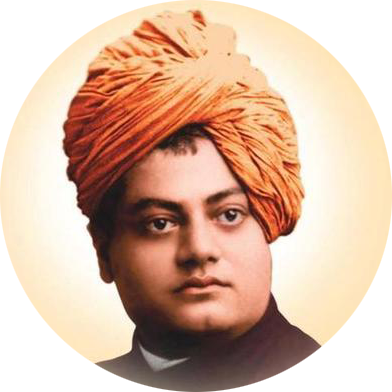
Response to Welcome
It fills my heart with joy unspeakable to rise in response to the warm and cordial welcome which you have given us. I thank you in the name of the most ancient order of monks in the world; I thank you in the name of the mother of religions, and I thank you in the name of the millions and millions of Hindu people of all classes and sects.
Today is the 11th of September. on this day in 1893 #SwamiVivekananda shared his world-famous speech at the World's Parliament of Religions at Chicago and given the message "We believe not only in universal toleration, but we accept all religions as true". pic.twitter.com/Kd0LfPzpEk — Swami Vivekananda (@vivekexpress) September 11, 2021
My thanks, also, to some of the speakers on this platform who, referring to the delegates from the Orient, have told you that these men from far-off nations may well claim the honour of bearing to different lands the idea of toleration. I am proud to belong to a religion which has taught the world both tolerance and universal acceptance. We believe not only in universal toleration, but we accept all religions as true. I am proud to belong to a nation which has sheltered the persecuted and the refugees of all religions and all nations of the earth. I am proud to tell you that we have gathered in our bosom the purest remnant of the Israelites, who came to southern India and took refuge with us in the very year in which their holy temple was shattered to pieces by Roman tyranny. I am proud to belong to the religion which has sheltered and is still fostering the remnant of the grand Zoroastrian nation. I will quote to you, brethren, a few lines from a hymn which I remember to have repeated from my earliest boyhood, which is every day repeated by millions of human beings: ‘As the different streams having their sources in different places all mingle their water in the sea, so, O Lord, the different paths which men take through different tendencies, various though they appear, crooked or straight, all lead to Thee.’
The present convention, which is one of the most august assemblies ever held, is in itself a vindication, a declaration to the world, of the wonderful doctrine preached in the Gita: ‘Whosoever comes to Me, through whatsoever form, I reach him; all men are struggling through paths which in the end lead to Me.’ Sectarianism, bigotry, and its horrible descendant, fanaticism, have long possessed this beautiful earth. They have filled the earth with violence, drenched it often and often with human blood, destroyed civilization, and sent whole nations to despair. Had it not been for these horrible demons, human society would be far more advanced than it is now. But their time is come; and I fervently hope that the bell that tolled this morning in honour of this convention may be the death-knell of all fanaticism, of all persecutions with the sword or with the pen, and of all uncharitable feelings between persons wending their way to the same goal.
Home | Quotes | Chicago Speech (English) | Chicago Speech (Hindi) | National Youth Day
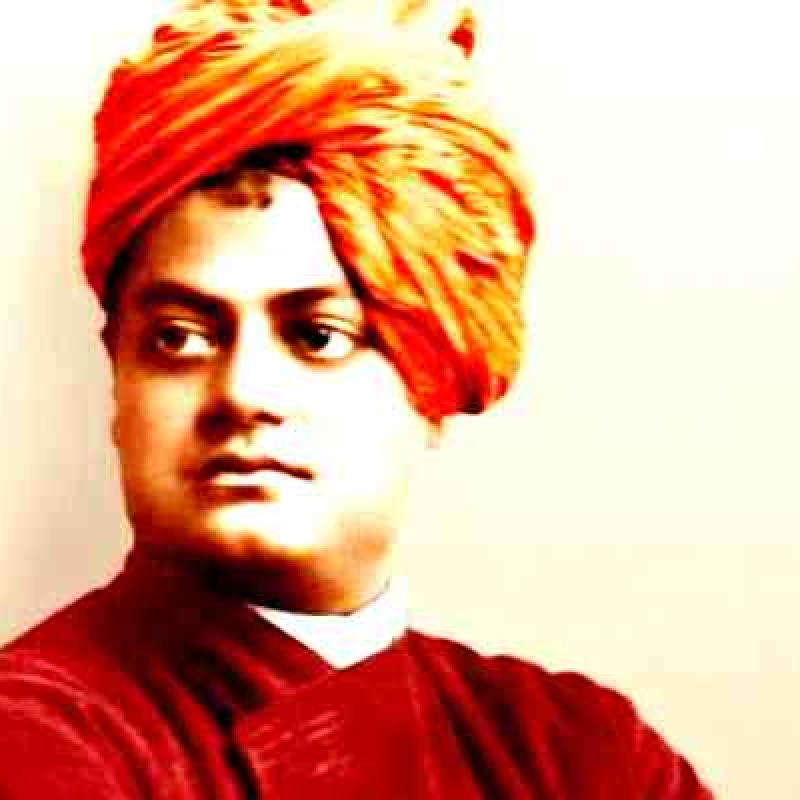
Vivekananda’s Chicago Speeches: What He Said – and Didn’t
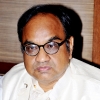
Amiya P. Sen
Amiya P. Sen is retired professor of modern Indian history at Jamia Millia Islamia, New Delhi, and Fellow, Oxford Centre for Hindu Studies, Oxford.
While Swami Vivekananda’s introductory speech at the World Parliament of Religions on September 11, 1893 is widely regarded as iconic, we note that, contrary to popular opinion, he did not advocate the idea of a ‘universal religion’, but championed the concept of a common goal or destiny (i.e., human salvation) for every religious community. (Photo courtesy: Manjappabg/Wikimedia Commons)
The idea of convening a global religious assembly was suggested by a Chicago lawyer, Charles Carroll Bonney, as early as 1889 as a part of the forthcoming World’s Columbian Exposition in 1893 to celebrate the 400th anniversary of Columbus’ discovery of America. At the parliament itself, John Henry Barrows, the president of the organising committee, boasted that only an affluent Christian nation such as America could have hosted an event of this magnitude. Ironically, this sentiment was to be echoed by Swami Vivekananda himself in two successive speeches at the parliament (September 15 and 19, 1893). Emperor Ashoka’s councils, the swami observed, were narrowly Buddhist, and those summoned by Akbar, only ‘parlour meetings’. [1]
It is believed that one of the dominant influences behind the Parliament of Religions was the presence of American Unitarians and ‘liberal’ Christians who were willing to accommodate non-Christian religions. It is fairly well established that these groups had supported successive visits by three prominent Indians to England and the USA even before 1893: Rammohun Roy (1830), Keshub Chunder Sen (1870) and Protap Chunder Mozoomdar (1883).
The Indian presence at Chicago was impressive. There were no less than a dozen delegates invited, though not all spoke at the parliament. There were delegates representing Indian Buddhism, Jainism, Theosophy, the Brahmo Samaj, Indian Islam and Christianity. The organising committee even invited the Kartabhaja [2] leader Dulalchandra Pal, but only some 60 years after he had passed away. Sadly, both public perception and scholarly inputs tend to neglect the presence and contributions of Indian speakers other than Vivekananda.
Also read | Perspectives on Caste: The Nineteenth-Century Bengali Literati
Between September 11 and 27, Swami Vivekananda delivered six speeches in Chicago. Of these, the opening address is the best known, if only for the novel and the somewhat dramatic way it began—addressing the audience as ‘Sisters and Brothers of America’. Interestingly, this is contested. While the official history of the parliament notes how ‘a peal of applause that lasted for several minutes’ followed the swami’s opening words, a contemporary publication titled A Chorus of Faith as Heard in the Parliament of Religions altogether omits such a reference.
In summary, the following features stand out in his Chicago speeches:
- An argument in favour of religious tolerance and accommodation as opposed to self-righteousness and bigotry, aptly illustrated by the ‘frog in the well’ ( kupamanduka ) story. In substance, Vivekananda emphasised the religious pluralism embedded in Hinduism. Contrary to widespread perceptions, the swami did not advocate the idea of a universal religion—not even of the unity of religious thought or practice—but championed the concept of a common goal or destiny (i.e., human salvation) for every religious community. [3]
- The questioning of religious conversion itself, arguing that holiness, purity and charity were not the exclusive domains of any one sect or church.
Vivekananda’s pluralism was somewhat marred by his denial of autonomy to Buddhism in relation to Hinduism. Further, his attempts to project Hinduism as a universalistic religion forced him to speak within a hierarchic framework of argument that had Hinduism, or at least his projection of it, at the top. He did not adequately address the question of whether an agreement between various religious traditions was a precondition for religious harmony. What Vivekananda also did not openly acknowledge was that even a dialogic openness between religions or admitting that they all pointed to the same God did not necessarily mean that all religions were, in essence, the same.
In substance, his addresses at the parliament were more enthused by a buoyant patriotism than a religious re-statement. This was true of most delegates from colonised Asia. Even on his first visit to the USA in 1883, Protap Chunder Mozoomdar (a leader of the Hindu reform movement) accused the West of misjudging India and Indians: ‘[W] hat the Occidental mind does not understand, it sets down to mysticism…you have no experience to give us but plenty of theories and criticisms’. In 1893 itself, a paper by author and social reformer Manilal Nanubhai Dwivedi countered presumptions in Western Christianity by suggesting that Biblical chronology itself was untenable in the light of science.
On occasion, Vivekananda’s patriotism got the better of his sense of historical objectivity. Two such instances are found in his opening address itself: when he identifies Hinduism as the ‘mother of all religions’, and when he wrongly claims that the Hindus produced the earliest order of monastics, which is more correctly associated with Buddhism.
In hindsight, Vivekananda’s popularity at Chicago may be attributed to several factors. First, there was undoubtedly the charisma of the man himself. Second, some of his statements fed into the contemporary American psyche. His point about the perfectibility of man proved attractive to a young nation that was greatly attuned to notions of success and power. Similarly, his critique of doctrinal Christianity came at a time when the American mind was growing disenchanted with such ideas.
While there was much patriotic jubilation in India following Vivekananda’s success in America, it is often overlooked that on his return to India, the much-acclaimed swami was denied access to the Dakshineswar Temple complex, where he often visited his guru, Sri Ramakrishna Paramahamsa. Reportedly, this was done on the grounds that he had suffered a fall from ritual purity when he crossed the sea. Others contested the idea of a Kayastha representing ‘high Hinduism’, a right reserved only for Brahmins. Such conflicting perceptions remain an unsavoury aspect of the events of 1893. It would appear as though an otherwise proud and grateful nation also revealed moments of cultural amnesia and ingratitude.
This article was also published on Scroll.in
Notes [1] I make it a point to mention this here since the intention and substance of Vivekananda’s speeches at Chicago were otherwise quite patriotic.
[2] A popular, non-sectarian cult that took birth in eighteenth-century Bengal, known for its rebuttal of high Hinduism and free gender mixing among members.
[3] This is made clear in the very first speech on September 11 when he said, ‘We believe not only in universal toleration but we accept all religions as true’. ‘Swami Vivekananda’s Speeches at the Parliament of Religions, Chicago, 1893,’ belurmath.org, n.d., accessed on September 9, 2019, https://belurmath.org/swami-vivekananda-speeches-at-the-parliament-of-r… .
More from Sahapedia
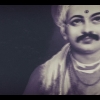
- Ground Reports
- 50-Word Edit
- National Interest
- Campus Voice
- Security Code
- Off The Cuff
- Democracy Wall
- Around Town
- PastForward
- In Pictures
- Last Laughs
- ThePrint Essential

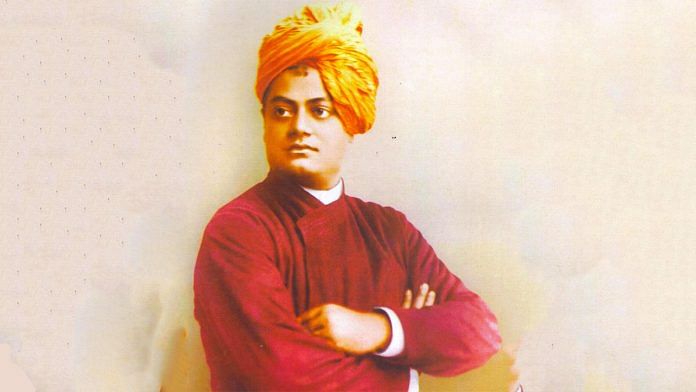
New Delhi: Swami Vivekananda, born Narendra Nath Datta, was one of India’s foremost religious philosophers. Known for his humanistic approach to the Vedas, the sacred texts of Hinduism, Vivekananda provided a window to the West to access the religion. He was a proponent of the Vedanta philosophy in the United States and England, and appeared as a spokesperson for Hinduism at the World’s Parliament of Religions at Chicago in 1893.
The audience was captivated by Vivekananda; one of the accounts described him as “an orator by divine right and undoubtedly the greatest figure at the Parliament”. On his return to India with a small group of Western disciples in 1897, Vivekananda founded the Ramakrishna Mission at Belur Math on the banks of the Hooghly (Ganga) near Kolkata.
Today, at a time when polarisation and fundamentalism has gripped the country, Vivekananda’s approach to Hinduism offers a salve. From a pitch for inclusivity to preaching universal tolerance, Vivekananda propagated Hinduism as a safe space that “has sheltered the persecuted and the refugees of all religions and all nations of the earth”.
On his 117th death anniversary, ThePrint brings you the full text of Swami Vivekananda’s speech in Chicago on 11 September 1893 that put Hinduism on an international platform.
***********************
S isters and brothers of America,
It fills my heart with joy unspeakable to rise in response to the warm and cordial welcome which you have given us. I thank you in the name of the most ancient order of monks in the world; I thank you in the name of the mother of religions, and I thank you in the name of millions and millions of Hindu people of all classes and sects.
My thanks, also, to some of the speakers on this platform who, referring to the delegates from the Orient, have told you that these men from far-off nations may well claim the honor of bearing to different lands the idea of toleration. I am proud to belong to a religion which has taught the world both tolerance and universal acceptance. We believe not only in universal toleration, but we accept all religions as true. I am proud to belong to a nation which has sheltered the persecuted and the refugees of all religions and all nations of the earth. I am proud to tell you that we have gathered in our bosom the purest remnant of the Israelites, who came to Southern India and took refuge with us in the very year in which their holy temple was shattered to pieces by Roman tyranny. I am proud to belong to the religion which has sheltered and is still fostering the remnant of the grand Zoroastrian nation. I will quote to you, brethren, a few lines from a hymn which I remember to have repeated from my earliest boyhood, which is every day repeated by millions of human beings: “As the different streams having their sources in different paths which men take through different tendencies, various though they appear, crooked or straight, all lead to Thee.”
The present convention, which is one of the most august assemblies ever held, is in itself a vindication, a declaration to the world of the wonderful doctrine preached in the Gita: “Whosoever comes to Me, through whatsoever form, I reach him; all men are struggling through paths which in the end lead to me.” Sectarianism, bigotry, and its horrible descendant, fanaticism, have long possessed this beautiful earth. They have filled the earth with violence, drenched it often and often with human blood, destroyed civilization and sent whole nations to despair. Had it not been for these horrible demons, human society would be far more advanced than it is now. But their time is come; and I fervently hope that the bell that tolled this morning in honor of this convention may be the death-knell of all fanaticism, of all persecutions with the sword or with the pen, and of all uncharitable feelings between persons wending their way to the same goal.
Address at the final session — Chicago, 27 September 1893
The World’s Parliament of Religions has become an accomplished fact, and the merciful Father has helped those who laboured to bring it into existence, and crowned with success their most unselfish labour.
My thanks to those noble souls whose large hearts and love of truth first dreamed this wonderful dream and then realized it.
My thanks to the shower of liberal sentiments that has overflowed this platform. My thanks to this enlightened audience for their uniform kindness to me and for their appreciation of every thought that tends to smooth the friction of religions. A few jarring notes were heard from time to time in this harmony. My special thanks to them, for they have, by their striking contrast, made general harmony the sweeter.
Much has been said of the common ground of religious unity. I am not going just now to venture my own theory. But if any one here hopes that this unity will come by the triumph of any one of the religions and the destruction of the others, to him I say, “Brother, yours is an impossible hope.” Do I wish that the Christian would become Hindu? God forbid. Do I wish that the Hindu or Buddhist would become Christian? God forbid.
The seed is put in the ground, and earth and air and water are placed around it. Does the seed become the earth, or the air, or the water? No. It becomes a plant. It develops after the law of its own growth, assimilates the air, the earth, and the water, converts them into plant substance, and grows into a plant.
Similar is the case with religion. The Christian is not to become a Hindu or a Buddhist, nor a Hindu or a Buddhist to become a Christian. But each must assimilate the spirit of the others and yet preserve his individuality and grow according to his own law of growth.
If the Parliament of Religions has shown anything to the world, it is this: It has proved to the world that holiness, purity and charity are not the exclusive possessions of any church in the world, and that every system has produced men and women of the most exalted character. In the face of this evidence, if anybody dreams of the exclusive survival of his own religion and the destruction of the others, I pity him from the bottom of my heart, and point out to him that upon the banner of every religion will soon be written in spite of resistance: “Help and not fight,” “Assimilation and not Destruction,” “Harmony and Peace and not Dissension.”
Also read: Nobody owns Swami Vivekananda, stop playing politics over him
Subscribe to our channels on YouTube , Telegram & WhatsApp
Support Our Journalism
India needs fair, non-hyphenated and questioning journalism, packed with on-ground reporting. ThePrint – with exceptional reporters, columnists and editors – is doing just that.
Sustaining this needs support from wonderful readers like you.
Whether you live in India or overseas, you can take a paid subscription by clicking here .
- death anniversary
- Swami Vivekananda
- ThePrintUncut
Strength is life Weakness is death
LEAVE A REPLY Cancel
Save my name, email, and website in this browser for the next time I comment.
Most Popular
In odisha’s kendrapara, the fight is between bjp’s baijayant panda and the legacy of biju patnaik, mihir bhoj row, rupala remarks, not enough tickets — why western up’s rajputs are angry with bjp, ‘killer’ cold waves in oceans lead to migration of marine species, finds nature climate change study.
Required fields are marked *
Copyright © 2024 Printline Media Pvt. Ltd. All rights reserved.
- Terms of Use
- Privacy Policy

Swami Vivekananda’s First Chicago Speech in Major Local Newspapers
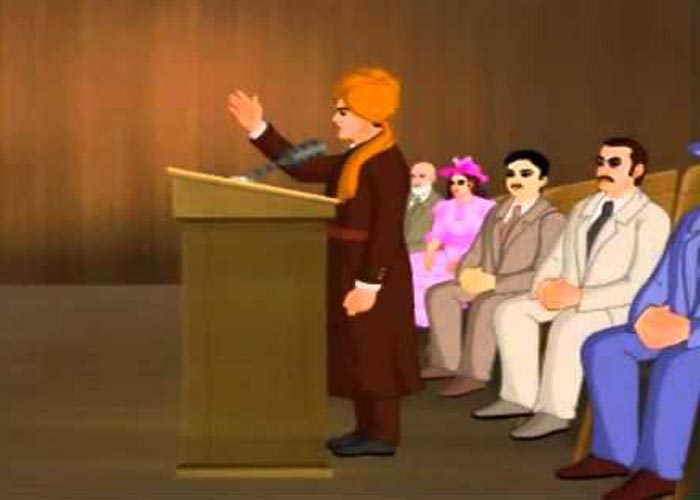
Introduction
Since it was first delivered, Swamiji’s iconic “Response to Welcome” speech on September 11, 1893, at the Parliament of Religions in Chicago has been read, re-read, dissected, analyzed, and its every word scrutinized ad infinitum. Most people who were involved in these activities sought out the first volume of the Complete Works of Swami Vivekananda as the authoritative source. 1 Another version of the speech appears in volume nine of the same series. This second version is a combination composed by Marie Louise Burke, who took the reports of the speech from four major Chicago newspapers and synthesized them to arrive at what the vast audience might have actually heard from Swamiji’s lips. 2 . A recent article in The Vedanta Kesari has compared the two versions in details by conflating the texts and then discussing the relative merits of each version. The author calls the first one “the short version,” and the second “the long version.” 3 That is how they will be referred to hereafter.
This article will document the sources of the two versions for present and future use. It will also present some background information on the sources and analyse them to help the readers understand the how’s and why’s of the process that led to the two versions.
Chicago newspapers of 1893
Before we go into the various reports of the speech, let us look at the “major” daily newspapers in Chicago at the time, keeping in mind that the names of the newspapers had a tendency to change slightly within a short span of time due to mergers or for other reasons: 4
Newspapers Time published
Chicago Daily News Evening The Chicago Dispatch Evening The Chicago Evening Journal Evening The Chicago Evening Post Evening Chicago Daily Globe Morning The Chicago Herald Morning The Daily Inter Ocean Morning Chicago Mail Evening The Chicago Times Morning The Chicago Daily Tribune Morning The Chicago Record Morning
The five morning papers whose microforms are presently available in the key Chicago libraries are: The Chicago Herald, The Chicago Daily Tribune, The Daily Inter Ocean, The Chicago Record, and Chicago Times. For brevity, these will henceforth be referred to as Herald, Tribune, Inter Ocean, Record, and Times. These covered the Parliament of Religions proceedings with varying degrees of detail, and frequently reported on Swamiji and his speeches; the Herald was undoubtedly the most comprehensive of them all; the Inter Ocean was next. All of them had one thing in common— they were all morning newspapers. The evening newspapers gave the Parliament only a cursory coverage. Since the evening papers were usually published by 5 p.m., they mostly reported on the morning programs, and that too in a rather perfunctory manner. Since most of Swamiji’s Parliament and Scientific Section speeches were during the late morning, afternoon, or evening sessions, the evening papers rarely mentioned them.
On September 12, four out of the five newspapers mentioned above reported on Swamiji’s maiden speech. We will get to those later. The Times, which had devoted to the Parliament proceedings three columns on September 12 under the heading “Men of Many Faiths,” reported on the morning session, but had only this to say about the afternoon session, when Swamiji spoke: “In the afternoon another session was held, and many addresses were made by distinguished representatives of the religions of the world.” In describing the representatives on the platform, the Times, however, wrote the following:
“The face and dress which attracted the most notice, especially from the ladies, was that of Suami [sic] Vivekananda, a young man exceptionally handsome and with features which would command attention anywhere. His dress was bright orange, and he wore a long coat and regulation turban of that color. Vivekananda is a Brahmin monk, and Prof. Wright of Harvard is quoted as saying that he is one of the best educated young men in the world.”
The Times didn’t even care to report on the speech by “one of the best educated young men in the world” who “would command attention anywhere.” The loss is theirs, but what is intriguing is how they came to know about the John Henry Wright quotation. Swamiji had Prof. Wright’s introductory letter (his only credential) with him, which probably mentioned in it the quoted words. But how did the reporter get hold of it? Swamiji was in circulation in Chicago only for a little over a day! We may never know the answer to that.
The speech as reported by four newspapers (September 12, 1893)
The Herald Most Ancient Order of Monks
Swami Vivekananda, of Bombay, India, was introduced after Rev. A. W. Momerie, of England, had spoken briefly. When Mr. Vivekananda had addressed the audience as “sisters and brothers of America,” there arose a peal of applause that lasted for several minutes. He spoke as follows:
It fills my heart with joy unspeakable to rise in response to the warm and cordial welcome which you have given us. I thank you in the name of the most ancient order of monks in the world; I thank you in the name of the mother of religions, and I thank you in the name of the millions and millions of Hindoo people of all classes and sects.
My thanks, also, to some of the speakers on this platform who have told you that these men from far off nations may well claim the honor of bearing to the different lands the idea of toleration. I am proud to belong to a religion which has taught the world both tolerance and universal acceptance. We believe not only in universal toleration, but we accept all religions to be true . I am proud to tell you that I belong to a religion into whose sacred language, the Sanscrit, the word seclusion is untranslatable . I am proud to belong to a nation which has sheltered the persecuted and the refugees of all religions and all nations of the earth. I am proud to tell you that we have gathered in our bosom the purest remnant of the Israelites, a remnant which came to southern India and took refuge with us in the very year in which their holy temple was shattered to pieces by Roman tyranny. I am proud to belong to the religion which has sheltered and is still fostering the remnant of the grand Zoroastrian nation. I will quote to you, brethren, a few lines from a hymn which I remember to have repeated from my earliest boyhood, which is every day repeated by millions of human beings: “As the different streams having their sources in different places all mingle their water in the sea, Oh, Lord, so the different paths which men take through different tendencies, various though they appear, crooked or straight, all lead to Thee.”
The present convention, which is one of the most august assemblies ever held, is in itself a vindication, a declaration to the world of the wonderful doctrine preached in Gita. “Whosoever comes to me, through whatsoever form I reach him, they are all struggling through paths that in the end always lead to me.” Sectarianism, bigotry, and its horrible descendant, fanaticism, have possessed long this beautiful earth. It has filled the earth with violence, drenched it often and often with human blood, destroyed civilization and sent whole nations to despair. Had it not been for this horrible demon human society would be far more advanced than it is now. But its time has come and I fervently hope that the bell that tolled this morning in honor of this convention be the death knell to all fanaticism, to all persecutions with the sword or the pen and to all uncharitable feelings between persons wending their way to the same goal.
—————x———————-x——————-x——————-
The Tribune Is a Deathknell to Persecution.
Swami Vivekananda was next introduced [after Rev. Momerie]. He said:
It is my unspeakable joy to rise in response to the grand words of welcome given to us by you. I thank you in the name of the most ancient order of monks the world has ever seen. I thank you in the name of the mother religion of which Buddhism and Jainism are but the branches. I thank you in the name of that ancient monastic order, and I thank you finally in the name of the millions and millions of the Hindoo people of all castes and sects. My thanks to some of the speakers on this platform who have told us that these men from the various nations will bear to the different lands the idea of toleration which they may see here. My thanks to them for this idea.
Sectarianism, bigotry, and its horrible descendant, fanaticism, have filled the earth with violence, drenched it often and often with human gore, destroyed civilization, and sent whole nations into despair. Had it not been for this horrible demon society would have been much farther advanced than it is. But its time has come and I fervently believe that the bell that tolled this morning in honor of the representatives of the different religions of the earth, in this parliament assembled, is the death-knell to all fanaticism [applause], that it is the death-knell to all persecution with the sword or the pen, and to all uncharitable feelings between brethren wending their way to the same goal, but through different ways. [Applause].
The Inter Ocean Suami Vivekenda [sic]
Said the chairman: “Great Britain is great indeed, great on the floor of this parliament. We are to hear again from the empire of India, and I am glad to present to this assembly Suami Vivekenda [sic]” [Applause.]
Suami Vivekenda said:
Sisters and brothers of America. [Great applause.] It is my unspeakable joy to rise in response to the grand words of welcome given to us by you. I thank you in the name of the most ancient order of monks the world has ever seen. I thank you in the name of the mother religion of which Buddhism and Janish [Jainism] are but the branches. I thank you in the name of that ancient 22The Vedanta Kesari March 2020 monastic order, and I thank you finally in the name of the millions and millions of the Hindoo people of all castes and tects [sects]. My thanks to some of the speakers on this platform who have told us that these men from the various nations will bear to the different lands the idea of toleration which they may see here. My thanks to them for this idea. I am proud to tell you that I belong to a religion in whose sacred language, the Sanscrit, constitution is untranslatable. [Applause.] I am proud to belong to a nation whose religion sheltered the persecuted and the refugees from all parts of the earth. I am proud to tell you that we have carried in our bosom the purest remnant of the Israelites who came to Southern India and took refuge with us in the very year in which their holy temple was shattered to pieces by Roman tyranny.
I will quote to you, brothers, a few lines from a hymn which every Hindoo child repeats every day. I feel that the very spirit of this hymn, which I remember to have repeated from my earliest boyhood, which is every day repeated by millions and millions of men in India, has at last come to be realized. The present convention, which is one of the most august assemblies as ever held, is in itself an indication, a declaration to the West of the wonderful doctrine preached in India.
Sectarianism, bigotry, and its horrible descendant, fanaticism, has filled the earth with violence, drenched it often and often with human gore, destroyed civilization and sent whole nations into despair. Had it not been for this horrible demon society would have been much farther advanced than it is. But its time has come, and I fervently believe that the bell that tolled this morning in honor of the representatives of the different religions of the earth, in this parliament assembled, is the death knell to all fanaticism. [Applause.] That it is the death knell to all persecution with the sword or the pen, and to all uncharitable feelings between brethren wending their way to the same goal, but through different ways. [Applause.]
Swami Dviva Kananda [sic], India: “I thank you in the name of the most ancient religion; I thank you in the name of that ancient monastic order of which Gautama was only a member, and finally I thank you in the name of the great Hindoo people. I claim a religion in which the word persecution is untranslatable . I am proud to belong to a nation which has been the refuge of the persecuted. The bell that tolled this morning was the death-knell of all fanaticism, the death-knell to persecution with sword and pen of brethren who are wending their way to the same good, but by different ways.
The speech as reported in Barrows’ book (“Barrows version”)
Swami Vivekananda, of Bombay, was next introduced. When Mr. Vivekananda addressed the audience as “sisters and brothers of America,” there arose a peal of applause that lasted for several minutes. He spoke as follows:
Speech of Mr. Vivekananda
It fills my heart with joy unspeakable to rise in response to the warm and cordial welcome which you have given us. I thank you in the name of the most ancient order of monks in the world; I thank you in the name of the mother of religions; and I thank you in the name of millions and millions of Hindu people of all classes and sects.
My thanks, also, to some of the speakers on this platform who have told you that these men from far-off nations may well claim the honor of bearing to the different lands the idea of toleration. I am proud to belong to a religion which has taught the world both tolerance and universal acceptance. We believe not only in universal toleration, but we accept all religions to be true. I am proud to tell you that I belong to a religion into whose sacred language, the Sanskrit, the word exclusion is untranslatable . I am proud to belong to a nation which has sheltered the persecuted and the refugees of all religions and all nations of the earth. I am proud to tell you that we have gathered in our bosom the purest remnant of the Israelites, a remnant which came to southern India and took refuge with us in the very year in which their holy Temple was shattered to pieces by Roman tyranny. I am proud to belong to the religion which has sheltered and is still fostering the remnant of the grand Zoroastrian nation. I will quote to you, brethren, a few lines from a hymn which I remember to have repeated from my earliest boyhood, which is every day repeated by millions of human beings: “As the different streams having their sources in different places all mingle their water in the sea, so, O Lord, the different paths which men take through different tendencies, various though they appear, crooked or straight, all lead to thee.”
The present Convention, which is one of the most august assemblies ever held, is in itself a vindication, a declaration to the world of the wonderful doctrine preached in the Gita: “Whosoever comes to me, through whatsoever form I reach him, they are all struggling through paths that in the end always lead to me.” Sectarianism, bigotry and its horrible descendant, fanaticism, have possessed long this beautiful earth. It has filled the earth with violence, drenched it often and often with human blood, destroyed civilization and sent whole nations to despair. Had it not been for this horrible demon, human society would be far more advanced than it is now. But its time has come, and I fervently hope that the bell that tolled this morning in honor of this convention may be the death knell to all fanaticism, to all persecutions with the sword or the pen, and to all uncharitable feelings between persons wending their way to the same goal. 5
Discussion of the reports
Now that we have here all the four available reports on the speech (readers can consult the Complete Works of Swami Vivekananda for the “short” and the “long” versions), we can address them individually and compare them with each other and the “short version,” which is the generally accepted version. It is important to mention here that, based on the existing hard copies and microforms, these were the only four newspapers that reported on the speech.
The Herald report is the longest and the most important one, because that was the mother-source for the “short version” of the speech. However, Barrows’ book, The World’s Parliament of Religions, published in 1893, first included this report with very minimal editing, as we can see. The significant difference between the two is one word in the sentence (see the Herald report): “I am proud to tell you that I belong to a religion into whose sacred language, the Sanscrit, the word seclusion is untranslatable.” The word is “seclusion” in the Herald version and “exclusion” in the Barrows version. The two words are somewhat similarsounding but, between the two, “exclusion” definitely makes more sense in the context. It is interesting to note that the Inter Ocean used in that place the word “constitution”, which doesn’t make any sense, and the Record “persecution.” This brings up the question: “What exact word did Swamiji say that was untranslatable in Sanskrit?”
It appears that he said “persecution.” According to the Inter Ocean, there was applause at the end of the sentence in question (there could have been applause after the previous sentence that ended with: “we accept all religions to be true”), so it is possible that the representatives of the Herald and Inter Ocean didn’t hear the word properly (the Tribune had that word in its headline) due to noise from the audience, but the representative of the Record did. Phonetically, “persecution” is closer to “seclusion” and “constitution” than is “exclusion.” Moreover, according to the three reports that mentioned the sentence, Swamiji went into the subject of the “persecuted” and “refugees” (“of all religions and all nations”) next. In that context, by “persecution” he must have meant religious persecution.
Eminent Sanskrit scholars have been contacted to find out if there is an equivalent word in Sanskrit for “religious persecution.” After considerable research into the matter, one such scholar concluded: “Sanskrit language as such—right from the period of the Vedas—did not have a word for religious persecution.” *
We therefore conclude that what Swamiji said was: “I am proud to tell you that I belong to a religion into whose sacred language, the Sanskrit, the word persecution is untranslatable.” And he was right.
When the “short version” was compiled years later, around 1907, by further editing the Barrows version, the sentence in question was included, but was eliminated later. 6 The decision to eliminate it was probably prompted by the uncertainty surrounding the “untranslatable” word, which had four significantly different versions floating around in the media, although there could have been other reasons.
The Tribune report is considerably shorter than the Herald’s, but it has a reference to Buddhism and Jainism that is absent in the latter. The Inter Ocean report, which is closer to the Herald report in its length and content, also had a similar reference.
The Record’s report is totally inadequate. First, it massacred Swamiji’s name (and so did the Inter Ocean). Second, it brought up Gautama’s name, which was not in the other three reports (although two of them referred to Buddhism). Dropping items that are in the other reports is understandable, but adding something that is not in the others is questionable. Since it is a live speech that is being reported, you edit things out, not in. But the Record, however, did get the word “persecution” right!
Interestingly, in the “long version,” Marie Louise Burke used for her synthesis materials that are both common and unique in the four newspaper reports, as she had proposed to do, but used the word “exclusion,” which none of the reports used; it was taken from the Barrows version. For reasons best known to herself, Burke didn’t mention the other three versions of the word.
Concluding remarks
One wishes that there had been arrangements to record the speeches on wax cylinders, a technology that was then available. Then we could hear Swamiji’s sonorous voice as he spoke, with all the correct inflections, syntax, and tone. But there is no indication that there was any such arrangement. Even if the speeches had been recorded, the shelf life of the cylinders would have been short, or there could have been other technical issues. ** It is unfortunate that more newspapers didn’t follow the Herald’s lead in reporting on the speech. Even if they had done so, it is also unfortunate that the hard copies of all extant newspapers of that date (September 12, 1893) are no longer available; some were never microfilmed before they disintegrated or disappeared. So, we have to be satisfied with the “short” and the “long” versions, along with their sources. Both versions reflect the mastery of the speaker in terms of organization, sentiment, train of thought, poise, confidence, and, finally, eloquence.
* Does the Sanskrit language have a word for ‘persecution’?
From among the major Sanskrit-English dictionaries, Monier Williams Sanskrit Dictionary has this entry: To PERSECUTE, v. a. बाध्(c. 1. बाधते – धितुं), प्रबाध्, परिबाध्, प्रतिबाध्, बाधार्थम् or द्रोहार्थम् अनुमृ (c. 1. – सरति – सर्त्तुं, c. 10. – मारयति – यितुं), द्वेषपूर्व्वम् अनुसृ, द्रुह् (c. 4. द्रुह्यति, द्रोहितुं), क्लिश् (c. 9. क्लिश्नाति क्लेशितुं), क्लेशं or द्रोहं कृ, अभिद्रोहं कृ, उपद्रवं कृ
But is the word connected to persecution based on religion?
The Apte Sanskrit dictionary gives असचद्विष्. – Persecuting those who are not (his) worshippers. For the same entry Monier Williams quoting a Rig Veda mantra states the following: असचद्विष्/ अ- सचद्विष् mfn. hating or persecuting the non-worshippers ([ BR. Gmn. ]) or not persecuting worshippers([ NBD. ]) RV. viii , 20 , 24 (voc.)
This term appears just only once in the entire Rigveda Samhita in the 8th Mandala 20th Sukta and 24th Mantra of the Rigveda. This is a mantra on the Maruts. The Maruts are praised as असचद्विषः
When read with the Sayana Acharya Commentary, which is the traditional authority in understanding the Vedas, the meaning of the mantra appears as: असचद्विषः असक्तशत्रवः शत्रुरहिताः –Those who are bereft of enemies or Those about whom the enemies are disinclined (to fight). Hence, the meaning given by the dictionaries to the term असचद्विषः is incorrect. Unless we find other contradicting evidences, we can conclude that Swamiji was correct in stating that the Sanskrit language as such – right from the period of the Vedas – did not have a word for religious persecution.
Monier Williams and Apte, probably merely looked into the etymology-root meanings and arrived at the meaning. But in determining the meaning of the Vedas, the meaning approved by the traditional commentators (who look into all the six Vedangas) carry more weightage than only grammatical analysis. Furthermore, the roots of the Vedic-Sanskrit words have many meanings, which may not be accounted fully in grammatical texts.
— Dr. M. Jayaraman, Director, Research Department, Krishnamacharya Yoga Mandiram, Chennai; Member, Expert panel for Yoga, TKDL-CSIR, Govt of India
** That, of course, didn’t stop the enthusiasts from making stuff up and putting it on the Internet (https:// www.latestly.com/lifestyle/festivals-events/swami-vivekanandas-iconic-1893-speech-in-chicagowatch-full-video-audio-of-the-historic-address-at-the-us-parliament-of-worlds-religions-584029. html.) This article, further supported by Marie Louise Burke’s “long version,” clearly indicates that the Internet version of Swamiji’s first speech is counterfeit.}
1) The Complete Works of Swami Vivekananda. 1:3
2) Ibid., 9: 429-430.
3) “Two Versions of Swami Vivekananda’s First Chicago Speech,” William Page. The Vedanta Kesari, January 2019, pp. 24-26.
4) Authentic Visitors’ Guide to the World’s Columbian Exposition and Chicago. Richard J. Murphy. Chicago: The Union News Co., 1892, p. 50.
5) The World’s Parliament of Religions. John Henry Barrows. Parliament Publishing Co., 1893, Vol 1, pp. 101-102.
6) Personal communication with Swami Atmarupananda of Houston, TX.
Source : Vedanta Kesari, March, 2020
Share This Story, Choose Your Platform!
About the author: asim chaudhuri.
Related Posts
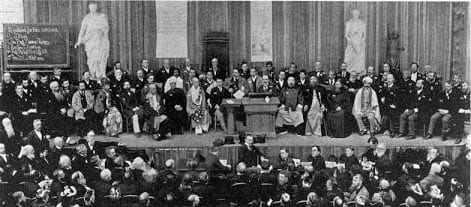
World’s Parliament of Religions in Swami Vivekananda’s own words
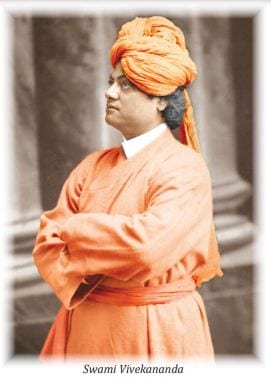
Inspiration from a Voice without Form
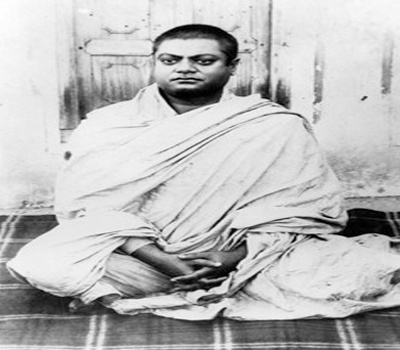
‘Is He a Man or a God?’

Swami Vivekananda and the Concept of Freedom in Indian Culture – Part 2
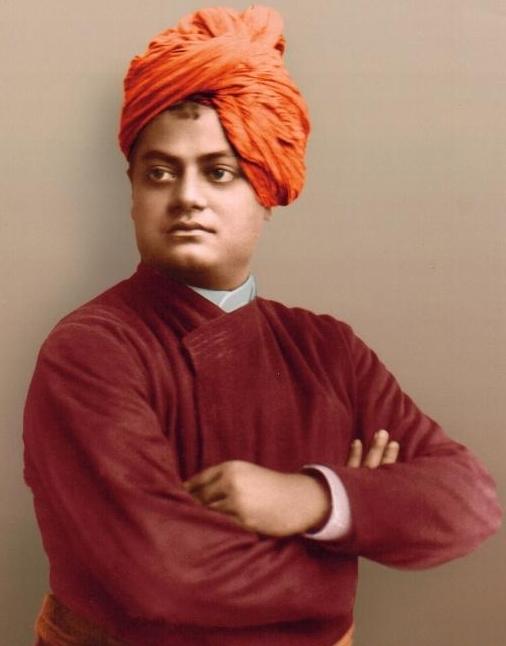
Erskine Mason Phelps: Swami Vivekananda’s First Host in America
Leave a comment cancel reply.
Notify me of follow-up comments by email.
Notify me of new posts by email.
Accessibility Tools
- Invert colors
- Dark contrast
- Light contrast
- Low saturation
- High saturation
- Highlight links
- Highlight headings
- Screen reader
- Our Mission
- Our History
- Our FOCUS24
- Latest News
- Ways to Give
Vivekananda’s Speech to 1893 Parliament
SWAMI VIVEKANANDA’s opening address to the World’s Parliament of Religions, Chicago, USA, 11 September, 1893
Sisters and Brothers of America, it fills my heart with joy unspeakable to rise in response to the warm and cordial welcome which you have given us. I thank you in the name of the most ancient order of monks in the world; I thank you in the name of the mother of religions; and I thank you in the name of the millions and millions of Hindu people of all classes and sects. My thanks, also, to some of the speakers on this platform who, referring to the delegates from the Orient, have told you that these men from far-off nations may well claim the honor of bearing to different lands the idea of toleration. I am proud to belong to a religion which has taught the world both tolerance and universal acceptance. We believe not only in universal toleration, but we accept all religions as true. I am proud to belong to a nation which has sheltered the persecuted and the refugees of all religions and all nations of the earth. I am proud to tell you that we have gathered in our bosom the purest remnant of the Israelites, who came to the southern India and took refuge with us in the very year in which their holy temple was shattered to pieces by Roman tyranny. I am proud to belong to the religion which has sheltered and is still fostering the remnant of the grand Zoroastrian nation. I will quote to you, brethren, a few lines from a hymn which I remember to have repeated from my earliest boyhood, which is every day repeated by millions of human beings:
As the different streams having there sources in different places all mingle their water in the sea, so, O Lord, the different paths which men take through different tendencies, various though they appear, crooked or straight, all lead to thee.
The present convention, which is one of the most august assemblies ever held, is in itself a vindication, a declaration to the world, of the wonderful doctrine preached in the Gita: Whosoever comes to Me, through whatsoever form, I reach him; all men are struggling through paths which in the end lead to me. Sectarianism, bigotry, and its horrible descendant, fanaticism, have long possessed this beautiful earth. They have filled the earth with violence, drenched it often and often with human blood, destroyed civilization, and sent whole nations to despair. Had it not been for these horrible demons, human society would be far more advanced than it is now. But their time is come; and I fervently hope that the bell that tolled this morning in honor of this convention may be the death-knell of all fanaticism, of all persecutions with the sword or with the pen, and of all uncharitable feelings between persons wending their way to the same goal.
We will keep fighting for all libraries - stand with us!
Internet Archive Audio

- This Just In
- Grateful Dead
- Old Time Radio
- 78 RPMs and Cylinder Recordings
- Audio Books & Poetry
- Computers, Technology and Science
- Music, Arts & Culture
- News & Public Affairs
- Spirituality & Religion
- Radio News Archive

- Flickr Commons
- Occupy Wall Street Flickr
- NASA Images
- Solar System Collection
- Ames Research Center

- All Software
- Old School Emulation
- MS-DOS Games
- Historical Software
- Classic PC Games
- Software Library
- Kodi Archive and Support File
- Vintage Software
- CD-ROM Software
- CD-ROM Software Library
- Software Sites
- Tucows Software Library
- Shareware CD-ROMs
- Software Capsules Compilation
- CD-ROM Images
- ZX Spectrum
- DOOM Level CD

- Smithsonian Libraries
- FEDLINK (US)
- Lincoln Collection
- American Libraries
- Canadian Libraries
- Universal Library
- Project Gutenberg
- Children's Library
- Biodiversity Heritage Library
- Books by Language
- Additional Collections

- Prelinger Archives
- Democracy Now!
- Occupy Wall Street
- TV NSA Clip Library
- Animation & Cartoons
- Arts & Music
- Computers & Technology
- Cultural & Academic Films
- Ephemeral Films
- Sports Videos
- Videogame Videos
- Youth Media
Search the history of over 866 billion web pages on the Internet.
Mobile Apps
- Wayback Machine (iOS)
- Wayback Machine (Android)
Browser Extensions
Archive-it subscription.
- Explore the Collections
- Build Collections
Save Page Now
Capture a web page as it appears now for use as a trusted citation in the future.
Please enter a valid web address
- Donate Donate icon An illustration of a heart shape
Swami Vivekananda 1893 Speech
Audio with external links item preview, share or embed this item, flag this item for.
- Graphic Violence
- Explicit Sexual Content
- Hate Speech
- Misinformation/Disinformation
- Marketing/Phishing/Advertising
- Misleading/Inaccurate/Missing Metadata

plus-circle Add Review comment Reviews
62,032 Views
7 Favorites
DOWNLOAD OPTIONS
In collections.
Uploaded by abhigutpa_99 on June 29, 2005
SIMILAR ITEMS (based on metadata)
Swami Vivekananda
BIOGRAPHICAL
- 1888 - 1892
- 1000 Island Park
- 95-96 New York
- Switzerland
- Way back to India
- En route to USA
- Ridgely Manor
- 1899-1900 Los Angeles
- San Francisco
- En route to India
- www.vivekananda.net edited by Frank Parlato Jr.
- TN Navbharat
- Times Drive
- ET Now Swadesh
Swami Vivekananda's iconic Chicago speech from 1893 is still relevant today -read the full text here
Updated Jan 11, 2023, 13:40 IST
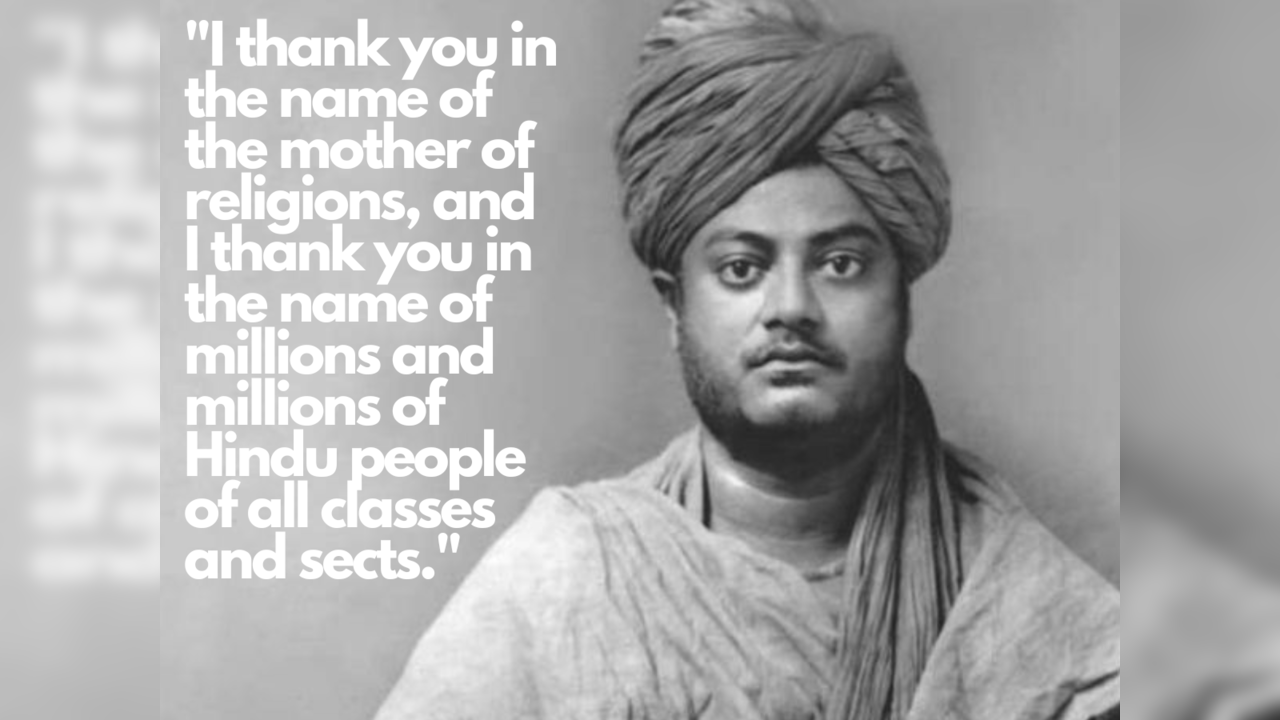
Swami Vivekananda 1893 Chicago Speech
Swami Vivekananda Speech in Chicago
Address at the final session — chicago, 27 september 1893.

'His Ticket For T20 World Cup Is Confirmed...': Virender Sehwag's Colossal Prediction For Rajasthan Royals Star

8 Best Thatte Idli Spots In Bengaluru For A Hearty Meal

'Jija Ji' From Amethi? Robert Vadra's Posters Outside Party Office Draw Speculations

It Feels Good That Kannada Films Are Being Released In Other Languages On OTT: Cricketer Anil Kumble

Mash di Dal to Phulkari Pulao This Festival Brings The 'Lost Cuisine of Punjab' Alive

iOS 17.5 Update: What's Coming to Your iPhone?

Aditi Ashok, Diksha Dagar Set To Participate In Paris Olympics 2024

Kareena Kapoor Khan, Taimur's 'Into The Wild' Moment, Experience Jungle Safari In Tanzania | UNSEEN PICS

Father & Son's Sweet Gesture Delights Elderly Flower Sellers. Viral Video Is Too Sweet To Miss

Optical Illusion: Can You Spot The Comb Hidden In This Classroom in 10 Seconds?

What’s With the ‘Look Between…On Your Keyboard’ Trend?

Viral Video: UK Man's Epic Bhangra Moves Wins Hearts Of Desi Netizens. Watch

'Harpic Nahi Tha?': Vendor Mixes Vimal Paan Masala In Ice Cream Roll, Netizens Horrified. Watch
- CBSE Class 10th
- CBSE Class 12th
- UP Board 10th
- UP Board 12th
- Bihar Board 10th
- Bihar Board 12th
- Top Schools in India
- Top Schools in Delhi
- Top Schools in Mumbai
- Top Schools in Chennai
- Top Schools in Hyderabad
- Top Schools in Kolkata
- Top Schools in Pune
- Top Schools in Bangalore
Products & Resources
- JEE Main Knockout April
- Free Sample Papers
- Free Ebooks
- NCERT Notes
- NCERT Syllabus
- NCERT Books
- RD Sharma Solutions
- Navodaya Vidyalaya Admission 2024-25
- NCERT Solutions
- NCERT Solutions for Class 12
- NCERT Solutions for Class 11
- NCERT solutions for Class 10
- NCERT solutions for Class 9
- NCERT solutions for Class 8
- NCERT Solutions for Class 7
- JEE Main 2024
- MHT CET 2024
- JEE Advanced 2024
- BITSAT 2024
- View All Engineering Exams
- Colleges Accepting B.Tech Applications
- Top Engineering Colleges in India
- Engineering Colleges in India
- Engineering Colleges in Tamil Nadu
- Engineering Colleges Accepting JEE Main
- Top IITs in India
- Top NITs in India
- Top IIITs in India
- JEE Main College Predictor
- JEE Main Rank Predictor
- MHT CET College Predictor
- AP EAMCET College Predictor
- GATE College Predictor
- KCET College Predictor
- JEE Advanced College Predictor
- View All College Predictors
- JEE Main Question Paper
- JEE Main Cutoff
- JEE Main Answer Key
- JEE Main Result
- Download E-Books and Sample Papers
- Compare Colleges
- B.Tech College Applications
- JEE Advanced Registration
- MAH MBA CET Exam
- View All Management Exams
Colleges & Courses
- MBA College Admissions
- MBA Colleges in India
- Top IIMs Colleges in India
- Top Online MBA Colleges in India
- MBA Colleges Accepting XAT Score
- BBA Colleges in India
- XAT College Predictor 2024
- SNAP College Predictor
- NMAT College Predictor
- MAT College Predictor 2024
- CMAT College Predictor 2024
- CAT Percentile Predictor 2023
- CAT 2023 College Predictor
- CMAT 2024 Registration
- TS ICET 2024 Registration
- CMAT Exam Date 2024
- MAH MBA CET Cutoff 2024
- Download Helpful Ebooks
- List of Popular Branches
- QnA - Get answers to your doubts
- IIM Fees Structure
- AIIMS Nursing
- Top Medical Colleges in India
- Top Medical Colleges in India accepting NEET Score
- Medical Colleges accepting NEET
- List of Medical Colleges in India
- List of AIIMS Colleges In India
- Medical Colleges in Maharashtra
- Medical Colleges in India Accepting NEET PG
- NEET College Predictor
- NEET PG College Predictor
- NEET MDS College Predictor
- DNB CET College Predictor
- DNB PDCET College Predictor
- NEET Application Form 2024
- NEET PG Application Form 2024
- NEET Cut off
- NEET Online Preparation
- Download Helpful E-books
- LSAT India 2024
- Colleges Accepting Admissions
- Top Law Colleges in India
- Law College Accepting CLAT Score
- List of Law Colleges in India
- Top Law Colleges in Delhi
- Top Law Collages in Indore
- Top Law Colleges in Chandigarh
- Top Law Collages in Lucknow
Predictors & E-Books
- CLAT College Predictor
- MHCET Law ( 5 Year L.L.B) College Predictor
- AILET College Predictor
- Sample Papers
- Compare Law Collages
- Careers360 Youtube Channel
- CLAT Syllabus 2025
- CLAT Previous Year Question Paper
- AIBE 18 Result 2023
- NID DAT Exam
- Pearl Academy Exam
Animation Courses
- Animation Courses in India
- Animation Courses in Bangalore
- Animation Courses in Mumbai
- Animation Courses in Pune
- Animation Courses in Chennai
- Animation Courses in Hyderabad
- Design Colleges in India
- Fashion Design Colleges in Bangalore
- Fashion Design Colleges in Mumbai
- Fashion Design Colleges in Pune
- Fashion Design Colleges in Delhi
- Fashion Design Colleges in Hyderabad
- Fashion Design Colleges in India
- Top Design Colleges in India
- Free Design E-books
- List of Branches
- Careers360 Youtube channel
- NIFT College Predictor
- UCEED College Predictor
- NID DAT College Predictor
- IPU CET BJMC
- JMI Mass Communication Entrance Exam
- IIMC Entrance Exam
- Media & Journalism colleges in Delhi
- Media & Journalism colleges in Bangalore
- Media & Journalism colleges in Mumbai
- List of Media & Journalism Colleges in India
- CA Intermediate
- CA Foundation
- CS Executive
- CS Professional
- Difference between CA and CS
- Difference between CA and CMA
- CA Full form
- CMA Full form
- CS Full form
- CA Salary In India
Top Courses & Careers
- Bachelor of Commerce (B.Com)
- Master of Commerce (M.Com)
- Company Secretary
- Cost Accountant
- Charted Accountant
- Credit Manager
- Financial Advisor
- Top Commerce Colleges in India
- Top Government Commerce Colleges in India
- Top Private Commerce Colleges in India
- Top M.Com Colleges in Mumbai
- Top B.Com Colleges in India
- IT Colleges in Tamil Nadu
- IT Colleges in Uttar Pradesh
- MCA Colleges in India
- BCA Colleges in India
Quick Links
- Information Technology Courses
- Programming Courses
- Web Development Courses
- Data Analytics Courses
- Big Data Analytics Courses
- RUHS Pharmacy Admission Test
- Top Pharmacy Colleges in India
- Pharmacy Colleges in Pune
- Pharmacy Colleges in Mumbai
- Colleges Accepting GPAT Score
- Pharmacy Colleges in Lucknow
- List of Pharmacy Colleges in Nagpur
- GPAT Result
- GPAT 2024 Admit Card
- GPAT Question Papers
- NCHMCT JEE 2024
- Mah BHMCT CET
- Top Hotel Management Colleges in Delhi
- Top Hotel Management Colleges in Hyderabad
- Top Hotel Management Colleges in Mumbai
- Top Hotel Management Colleges in Tamil Nadu
- Top Hotel Management Colleges in Maharashtra
- B.Sc Hotel Management
- Hotel Management
- Diploma in Hotel Management and Catering Technology
Diploma Colleges
- Top Diploma Colleges in Maharashtra
- UPSC IAS 2024
- SSC CGL 2024
- IBPS RRB 2024
- Previous Year Sample Papers
- Free Competition E-books
- Sarkari Result
- QnA- Get your doubts answered
- UPSC Previous Year Sample Papers
- CTET Previous Year Sample Papers
- SBI Clerk Previous Year Sample Papers
- NDA Previous Year Sample Papers
Upcoming Events
- NDA Application Form 2024
- UPSC IAS Application Form 2024
- CDS Application Form 2024
- CTET Admit card 2024
- HP TET Result 2023
- SSC GD Constable Admit Card 2024
- UPTET Notification 2024
- SBI Clerk Result 2024
Other Exams
- SSC CHSL 2024
- UP PCS 2024
- UGC NET 2024
- RRB NTPC 2024
- IBPS PO 2024
- IBPS Clerk 2024
- IBPS SO 2024
- Top University in USA
- Top University in Canada
- Top University in Ireland
- Top Universities in UK
- Top Universities in Australia
- Best MBA Colleges in Abroad
- Business Management Studies Colleges
Top Countries
- Study in USA
- Study in UK
- Study in Canada
- Study in Australia
- Study in Ireland
- Study in Germany
- Study in China
- Study in Europe
Student Visas
- Student Visa Canada
- Student Visa UK
- Student Visa USA
- Student Visa Australia
- Student Visa Germany
- Student Visa New Zealand
- Student Visa Ireland
- CUET PG 2024
- IGNOU B.Ed Admission 2024
- DU Admission 2024
- UP B.Ed JEE 2024
- LPU NEST 2024
- IIT JAM 2024
- IGNOU Online Admission 2024
- Universities in India
- Top Universities in India 2024
- Top Colleges in India
- Top Universities in Uttar Pradesh 2024
- Top Universities in Bihar
- Top Universities in Madhya Pradesh 2024
- Top Universities in Tamil Nadu 2024
- Central Universities in India
- CUET Exam City Intimation Slip 2024
- IGNOU Date Sheet
- CUET Mock Test 2024
- CUET Admit card 2024
- CUET PG Syllabus 2024
- CUET Participating Universities 2024
- CUET Previous Year Question Paper
- CUET Syllabus 2024 for Science Students
- E-Books and Sample Papers
- CUET Exam Pattern 2024
- CUET Exam Date 2024
- CUET Syllabus 2024
- IGNOU Exam Form 2024
- IGNOU Result
- CUET Courses List 2024
Engineering Preparation
- Knockout JEE Main 2024
- Test Series JEE Main 2024
- JEE Main 2024 Rank Booster
Medical Preparation
- Knockout NEET 2024
- Test Series NEET 2024
- Rank Booster NEET 2024
Online Courses
- JEE Main One Month Course
- NEET One Month Course
- IBSAT Free Mock Tests
- IIT JEE Foundation Course
- Knockout BITSAT 2024
- Career Guidance Tool
Top Streams
- IT & Software Certification Courses
- Engineering and Architecture Certification Courses
- Programming And Development Certification Courses
- Business and Management Certification Courses
- Marketing Certification Courses
- Health and Fitness Certification Courses
- Design Certification Courses
Specializations
- Digital Marketing Certification Courses
- Cyber Security Certification Courses
- Artificial Intelligence Certification Courses
- Business Analytics Certification Courses
- Data Science Certification Courses
- Cloud Computing Certification Courses
- Machine Learning Certification Courses
- View All Certification Courses
- UG Degree Courses
- PG Degree Courses
- Short Term Courses
- Free Courses
- Online Degrees and Diplomas
- Compare Courses
Top Providers
- Coursera Courses
- Udemy Courses
- Edx Courses
- Swayam Courses
- upGrad Courses
- Simplilearn Courses
- Great Learning Courses
Access premium articles, webinars, resources to make the best decisions for career, course, exams, scholarships, study abroad and much more with
Plan, Prepare & Make the Best Career Choices
Swami Vivekananda Speech - 10 Lines, Short and Long Speech
Speech on swami vivekananda.
One of the most significant monks India has ever known is Swami Vivekananda. He is a tremendous liberation fighter who led an incredible life, and we should all be motivated by his example to do our part to advance humankind.
10 Line Speech on Swami Vivekananda
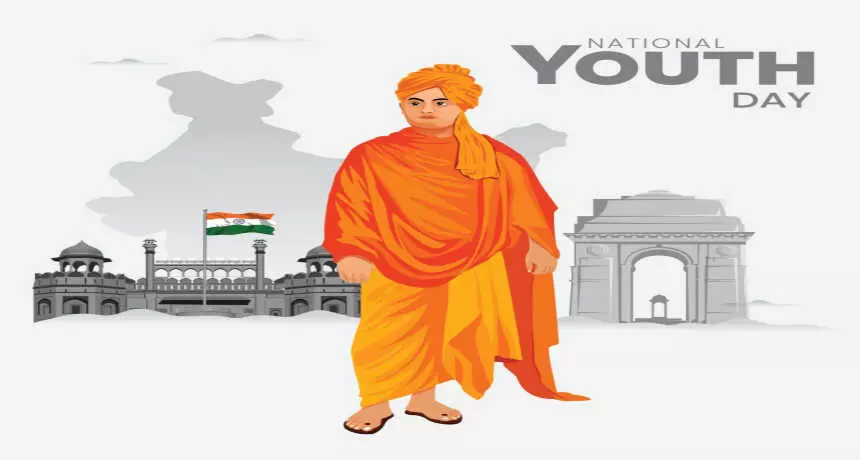
Swami Vivekananda was one of India's most notable and illustrious figures.
He was one of nine children born into the Datta family of Calcutta on January 12, 1863.
The philosopher's real name was Narendranath Dutta. Ajit Singh, the king of the princely state of Khetri, named him Vivekananda. The name means "joy of life with wisdom."
He was the revered religious figure Ramkrishna's most devoted follower.
Swami Vivekananda graduated from the University of Calcutta, studied law, and then began working as an advocate in the Calcutta High Court.
His mother was a devoutly religious woman who significantly impacted his life.
He learned that one must strive to serve people to manifest God from his Guru visually.
His teachings significantly influenced society as he shared his life's lessons with the general public.
In addition to making him famous, his address at the World's Parliament of Religions on Hinduism was a significant victory for India and the Hindu religion.
He died on July 4, 1902.
Short Speech On Swami Vivekananda
Swami Vivekananda was well renowned for having a positive outlook on life. He is credited with bringing new beginnings to 19th-century India. He is a great soul and human being. On January 12, 1863, he was born and was among the Datta family's nine children. Swami Vivekananda was raised in a distinguished academic household. His grandfather was a Persian and Sanskrit scholar, and his father was a lawyer in the Calcutta High Court.
Academics And Life After
After graduating, Swami Vivekananda followed a legal career in the same direction as his father. Even at the Calcutta High Court, he practised law. But Swami Vivekanda also had a solid religious temperament that he developed in his early years, which inspired him to pursue spirituality. Swami Vivekananda immersed himself in Indian religion and philosophy.
He adhered to Sri Ramakrishna's teaching that one serves God by serving others. He shared the same message and significantly influenced Indian society and traditions through his teachings. The Vedas and the Upanishads, seen as a great source of power, vitality, and wisdom for Indian civilization, served as the primary inspiration for Swami Vivekananda's teachings.
Contributions
It is also well known that Swami Vivekananda organised and started a mission named after his Guru, Sri Ramakrishna. This organisation, also known as the Sri Ramakrishna Mission, consists of preachers and saints who devote their free time to serving the underprivileged.
Long Speech On Swami Vivekananda
On January 12, 1863, at his ancestral home in Calcutta, Swami Vivekananda was born Narendranath Datta. His father, Vishwanath Datta, worked as an attorney in the Calcutta High Court, and he was one of nine children. Bhubaneswari Devi, Swami Vivekananda's mother, was a devoted housewife. According to his mother, he was a very mischievous boy who was constantly restless.
Education And Interest
Vivekananda, also known as Narendranath, developed a keen interest in spirituality at a young age and used to practise meditation in front of statues and idols of Hindu deities. The ascetics and itinerant monks captivated young Narendranath as well.
Vivekananda enrolled in north Calcutta's Vidyasagar College. He and his family relocated to Raipur later in 1877. When he returned to Calcutta in 1879, he was the only student to pass the prestigious Presidency College's entrance exam with a first-class grade.
Vivekananda was an avid reader interested in various fields, including history, philosophy, literature, and religion. He was also interested in Hindu scriptures such as the Vedas, Upanishads, Mahabharata, Ramayana, and Bhagavad Gita.
Vivekananda, who studied Indian Classical Music, regularly engaged in athletics and other physical pursuits. Vivekananda earned his Bachelor of Arts degree from the esteemed Christian College in Calcutta in 1884.
William Hastie, the principal of the Christian college, had stated that, “Vivekananda was genuinely brilliant. Despite my extensive travels, I have never encountered a young guy with talent and potential—not even in German universities among philosophy students. He'll undoubtedly leave his mark on the world.”
Founding Ramkrishna Mission
On May 1, 1897, Swami Vivekananda established the Ramkrishna Mission at Belur Math, close to Calcutta. The Ramkrishna Mission was founded on the principles of Karma yoga, focusing on helping the underprivileged and needy.
Along with providing other social services, Ramkrishna Mission also established and managed hospitals, colleges, and schools. The mission also spread Vedanta through seminars, workshops, and conferences. Additionally, it contributed to numerous relief and reconstruction projects across the nation.
Living Life Like A Monk
After Ramkrishna Paramhans passed away in 1886, his devotees refused to support Vivekananda and his other disciples. They were made to reside in a run-down building in Baranagar, North Calcutta. This structure was designated as the first Ramkrishna-order temple. In the same math, Vivekananda and fifteen other Ramkrishna disciples took their vows to become monks. They practised yoga and meditation and thrived by begging for alms or becoming "madhukari."
Swami Vivekananda was the most significant spiritual leader the world has ever known. He spread the Hindu philosophy and religion worldwide, making it known on a grand scale. Across all religions, cultures, and faiths, his words have influenced countless people. He made long, monk-like travels the length and breadth of India. His sole possessions were a water pitcher, a stick, and his two favourite books, The Imitation of Christ and The Bhagavad Gita.
Explore Career Options (By Industry)
- Construction
- Entertainment
- Manufacturing
- Information Technology
Data Administrator
Database professionals use software to store and organise data such as financial information, and customer shipping records. Individuals who opt for a career as data administrators ensure that data is available for users and secured from unauthorised sales. DB administrators may work in various types of industries. It may involve computer systems design, service firms, insurance companies, banks and hospitals.

Bio Medical Engineer
The field of biomedical engineering opens up a universe of expert chances. An Individual in the biomedical engineering career path work in the field of engineering as well as medicine, in order to find out solutions to common problems of the two fields. The biomedical engineering job opportunities are to collaborate with doctors and researchers to develop medical systems, equipment, or devices that can solve clinical problems. Here we will be discussing jobs after biomedical engineering, how to get a job in biomedical engineering, biomedical engineering scope, and salary.
Ethical Hacker
A career as ethical hacker involves various challenges and provides lucrative opportunities in the digital era where every giant business and startup owns its cyberspace on the world wide web. Individuals in the ethical hacker career path try to find the vulnerabilities in the cyber system to get its authority. If he or she succeeds in it then he or she gets its illegal authority. Individuals in the ethical hacker career path then steal information or delete the file that could affect the business, functioning, or services of the organization.
GIS officer work on various GIS software to conduct a study and gather spatial and non-spatial information. GIS experts update the GIS data and maintain it. The databases include aerial or satellite imagery, latitudinal and longitudinal coordinates, and manually digitized images of maps. In a career as GIS expert, one is responsible for creating online and mobile maps.
Data Analyst
The invention of the database has given fresh breath to the people involved in the data analytics career path. Analysis refers to splitting up a whole into its individual components for individual analysis. Data analysis is a method through which raw data are processed and transformed into information that would be beneficial for user strategic thinking.
Data are collected and examined to respond to questions, evaluate hypotheses or contradict theories. It is a tool for analyzing, transforming, modeling, and arranging data with useful knowledge, to assist in decision-making and methods, encompassing various strategies, and is used in different fields of business, research, and social science.
Geothermal Engineer
Individuals who opt for a career as geothermal engineers are the professionals involved in the processing of geothermal energy. The responsibilities of geothermal engineers may vary depending on the workplace location. Those who work in fields design facilities to process and distribute geothermal energy. They oversee the functioning of machinery used in the field.
Database Architect
If you are intrigued by the programming world and are interested in developing communications networks then a career as database architect may be a good option for you. Data architect roles and responsibilities include building design models for data communication networks. Wide Area Networks (WANs), local area networks (LANs), and intranets are included in the database networks. It is expected that database architects will have in-depth knowledge of a company's business to develop a network to fulfil the requirements of the organisation. Stay tuned as we look at the larger picture and give you more information on what is db architecture, why you should pursue database architecture, what to expect from such a degree and what your job opportunities will be after graduation. Here, we will be discussing how to become a data architect. Students can visit NIT Trichy , IIT Kharagpur , JMI New Delhi .
Remote Sensing Technician
Individuals who opt for a career as a remote sensing technician possess unique personalities. Remote sensing analysts seem to be rational human beings, they are strong, independent, persistent, sincere, realistic and resourceful. Some of them are analytical as well, which means they are intelligent, introspective and inquisitive.
Remote sensing scientists use remote sensing technology to support scientists in fields such as community planning, flight planning or the management of natural resources. Analysing data collected from aircraft, satellites or ground-based platforms using statistical analysis software, image analysis software or Geographic Information Systems (GIS) is a significant part of their work. Do you want to learn how to become remote sensing technician? There's no need to be concerned; we've devised a simple remote sensing technician career path for you. Scroll through the pages and read.
Budget Analyst
Budget analysis, in a nutshell, entails thoroughly analyzing the details of a financial budget. The budget analysis aims to better understand and manage revenue. Budget analysts assist in the achievement of financial targets, the preservation of profitability, and the pursuit of long-term growth for a business. Budget analysts generally have a bachelor's degree in accounting, finance, economics, or a closely related field. Knowledge of Financial Management is of prime importance in this career.
Underwriter
An underwriter is a person who assesses and evaluates the risk of insurance in his or her field like mortgage, loan, health policy, investment, and so on and so forth. The underwriter career path does involve risks as analysing the risks means finding out if there is a way for the insurance underwriter jobs to recover the money from its clients. If the risk turns out to be too much for the company then in the future it is an underwriter who will be held accountable for it. Therefore, one must carry out his or her job with a lot of attention and diligence.
Finance Executive
Product manager.
A Product Manager is a professional responsible for product planning and marketing. He or she manages the product throughout the Product Life Cycle, gathering and prioritising the product. A product manager job description includes defining the product vision and working closely with team members of other departments to deliver winning products.
Operations Manager
Individuals in the operations manager jobs are responsible for ensuring the efficiency of each department to acquire its optimal goal. They plan the use of resources and distribution of materials. The operations manager's job description includes managing budgets, negotiating contracts, and performing administrative tasks.
Stock Analyst
Individuals who opt for a career as a stock analyst examine the company's investments makes decisions and keep track of financial securities. The nature of such investments will differ from one business to the next. Individuals in the stock analyst career use data mining to forecast a company's profits and revenues, advise clients on whether to buy or sell, participate in seminars, and discussing financial matters with executives and evaluate annual reports.
A Researcher is a professional who is responsible for collecting data and information by reviewing the literature and conducting experiments and surveys. He or she uses various methodological processes to provide accurate data and information that is utilised by academicians and other industry professionals. Here, we will discuss what is a researcher, the researcher's salary, types of researchers.
Welding Engineer
Welding Engineer Job Description: A Welding Engineer work involves managing welding projects and supervising welding teams. He or she is responsible for reviewing welding procedures, processes and documentation. A career as Welding Engineer involves conducting failure analyses and causes on welding issues.
Transportation Planner
A career as Transportation Planner requires technical application of science and technology in engineering, particularly the concepts, equipment and technologies involved in the production of products and services. In fields like land use, infrastructure review, ecological standards and street design, he or she considers issues of health, environment and performance. A Transportation Planner assigns resources for implementing and designing programmes. He or she is responsible for assessing needs, preparing plans and forecasts and compliance with regulations.
Environmental Engineer
Individuals who opt for a career as an environmental engineer are construction professionals who utilise the skills and knowledge of biology, soil science, chemistry and the concept of engineering to design and develop projects that serve as solutions to various environmental problems.
Safety Manager
A Safety Manager is a professional responsible for employee’s safety at work. He or she plans, implements and oversees the company’s employee safety. A Safety Manager ensures compliance and adherence to Occupational Health and Safety (OHS) guidelines.
Conservation Architect
A Conservation Architect is a professional responsible for conserving and restoring buildings or monuments having a historic value. He or she applies techniques to document and stabilise the object’s state without any further damage. A Conservation Architect restores the monuments and heritage buildings to bring them back to their original state.
Structural Engineer
A Structural Engineer designs buildings, bridges, and other related structures. He or she analyzes the structures and makes sure the structures are strong enough to be used by the people. A career as a Structural Engineer requires working in the construction process. It comes under the civil engineering discipline. A Structure Engineer creates structural models with the help of computer-aided design software.
Highway Engineer
Highway Engineer Job Description: A Highway Engineer is a civil engineer who specialises in planning and building thousands of miles of roads that support connectivity and allow transportation across the country. He or she ensures that traffic management schemes are effectively planned concerning economic sustainability and successful implementation.
Field Surveyor
Are you searching for a Field Surveyor Job Description? A Field Surveyor is a professional responsible for conducting field surveys for various places or geographical conditions. He or she collects the required data and information as per the instructions given by senior officials.
Orthotist and Prosthetist
Orthotists and Prosthetists are professionals who provide aid to patients with disabilities. They fix them to artificial limbs (prosthetics) and help them to regain stability. There are times when people lose their limbs in an accident. In some other occasions, they are born without a limb or orthopaedic impairment. Orthotists and prosthetists play a crucial role in their lives with fixing them to assistive devices and provide mobility.
Pathologist
A career in pathology in India is filled with several responsibilities as it is a medical branch and affects human lives. The demand for pathologists has been increasing over the past few years as people are getting more aware of different diseases. Not only that, but an increase in population and lifestyle changes have also contributed to the increase in a pathologist’s demand. The pathology careers provide an extremely huge number of opportunities and if you want to be a part of the medical field you can consider being a pathologist. If you want to know more about a career in pathology in India then continue reading this article.
Veterinary Doctor
Speech therapist, gynaecologist.
Gynaecology can be defined as the study of the female body. The job outlook for gynaecology is excellent since there is evergreen demand for one because of their responsibility of dealing with not only women’s health but also fertility and pregnancy issues. Although most women prefer to have a women obstetrician gynaecologist as their doctor, men also explore a career as a gynaecologist and there are ample amounts of male doctors in the field who are gynaecologists and aid women during delivery and childbirth.
Audiologist
The audiologist career involves audiology professionals who are responsible to treat hearing loss and proactively preventing the relevant damage. Individuals who opt for a career as an audiologist use various testing strategies with the aim to determine if someone has a normal sensitivity to sounds or not. After the identification of hearing loss, a hearing doctor is required to determine which sections of the hearing are affected, to what extent they are affected, and where the wound causing the hearing loss is found. As soon as the hearing loss is identified, the patients are provided with recommendations for interventions and rehabilitation such as hearing aids, cochlear implants, and appropriate medical referrals. While audiology is a branch of science that studies and researches hearing, balance, and related disorders.
An oncologist is a specialised doctor responsible for providing medical care to patients diagnosed with cancer. He or she uses several therapies to control the cancer and its effect on the human body such as chemotherapy, immunotherapy, radiation therapy and biopsy. An oncologist designs a treatment plan based on a pathology report after diagnosing the type of cancer and where it is spreading inside the body.
Are you searching for an ‘Anatomist job description’? An Anatomist is a research professional who applies the laws of biological science to determine the ability of bodies of various living organisms including animals and humans to regenerate the damaged or destroyed organs. If you want to know what does an anatomist do, then read the entire article, where we will answer all your questions.
For an individual who opts for a career as an actor, the primary responsibility is to completely speak to the character he or she is playing and to persuade the crowd that the character is genuine by connecting with them and bringing them into the story. This applies to significant roles and littler parts, as all roles join to make an effective creation. Here in this article, we will discuss how to become an actor in India, actor exams, actor salary in India, and actor jobs.
Individuals who opt for a career as acrobats create and direct original routines for themselves, in addition to developing interpretations of existing routines. The work of circus acrobats can be seen in a variety of performance settings, including circus, reality shows, sports events like the Olympics, movies and commercials. Individuals who opt for a career as acrobats must be prepared to face rejections and intermittent periods of work. The creativity of acrobats may extend to other aspects of the performance. For example, acrobats in the circus may work with gym trainers, celebrities or collaborate with other professionals to enhance such performance elements as costume and or maybe at the teaching end of the career.
Video Game Designer
Career as a video game designer is filled with excitement as well as responsibilities. A video game designer is someone who is involved in the process of creating a game from day one. He or she is responsible for fulfilling duties like designing the character of the game, the several levels involved, plot, art and similar other elements. Individuals who opt for a career as a video game designer may also write the codes for the game using different programming languages.
Depending on the video game designer job description and experience they may also have to lead a team and do the early testing of the game in order to suggest changes and find loopholes.
Radio Jockey
Radio Jockey is an exciting, promising career and a great challenge for music lovers. If you are really interested in a career as radio jockey, then it is very important for an RJ to have an automatic, fun, and friendly personality. If you want to get a job done in this field, a strong command of the language and a good voice are always good things. Apart from this, in order to be a good radio jockey, you will also listen to good radio jockeys so that you can understand their style and later make your own by practicing.
A career as radio jockey has a lot to offer to deserving candidates. If you want to know more about a career as radio jockey, and how to become a radio jockey then continue reading the article.
Choreographer
The word “choreography" actually comes from Greek words that mean “dance writing." Individuals who opt for a career as a choreographer create and direct original dances, in addition to developing interpretations of existing dances. A Choreographer dances and utilises his or her creativity in other aspects of dance performance. For example, he or she may work with the music director to select music or collaborate with other famous choreographers to enhance such performance elements as lighting, costume and set design.
Social Media Manager
A career as social media manager involves implementing the company’s or brand’s marketing plan across all social media channels. Social media managers help in building or improving a brand’s or a company’s website traffic, build brand awareness, create and implement marketing and brand strategy. Social media managers are key to important social communication as well.
Photographer
Photography is considered both a science and an art, an artistic means of expression in which the camera replaces the pen. In a career as a photographer, an individual is hired to capture the moments of public and private events, such as press conferences or weddings, or may also work inside a studio, where people go to get their picture clicked. Photography is divided into many streams each generating numerous career opportunities in photography. With the boom in advertising, media, and the fashion industry, photography has emerged as a lucrative and thrilling career option for many Indian youths.
An individual who is pursuing a career as a producer is responsible for managing the business aspects of production. They are involved in each aspect of production from its inception to deception. Famous movie producers review the script, recommend changes and visualise the story.
They are responsible for overseeing the finance involved in the project and distributing the film for broadcasting on various platforms. A career as a producer is quite fulfilling as well as exhaustive in terms of playing different roles in order for a production to be successful. Famous movie producers are responsible for hiring creative and technical personnel on contract basis.
Copy Writer
In a career as a copywriter, one has to consult with the client and understand the brief well. A career as a copywriter has a lot to offer to deserving candidates. Several new mediums of advertising are opening therefore making it a lucrative career choice. Students can pursue various copywriter courses such as Journalism , Advertising , Marketing Management . Here, we have discussed how to become a freelance copywriter, copywriter career path, how to become a copywriter in India, and copywriting career outlook.
In a career as a vlogger, one generally works for himself or herself. However, once an individual has gained viewership there are several brands and companies that approach them for paid collaboration. It is one of those fields where an individual can earn well while following his or her passion.
Ever since internet costs got reduced the viewership for these types of content has increased on a large scale. Therefore, a career as a vlogger has a lot to offer. If you want to know more about the Vlogger eligibility, roles and responsibilities then continue reading the article.
For publishing books, newspapers, magazines and digital material, editorial and commercial strategies are set by publishers. Individuals in publishing career paths make choices about the markets their businesses will reach and the type of content that their audience will be served. Individuals in book publisher careers collaborate with editorial staff, designers, authors, and freelance contributors who develop and manage the creation of content.
Careers in journalism are filled with excitement as well as responsibilities. One cannot afford to miss out on the details. As it is the small details that provide insights into a story. Depending on those insights a journalist goes about writing a news article. A journalism career can be stressful at times but if you are someone who is passionate about it then it is the right choice for you. If you want to know more about the media field and journalist career then continue reading this article.
Individuals in the editor career path is an unsung hero of the news industry who polishes the language of the news stories provided by stringers, reporters, copywriters and content writers and also news agencies. Individuals who opt for a career as an editor make it more persuasive, concise and clear for readers. In this article, we will discuss the details of the editor's career path such as how to become an editor in India, editor salary in India and editor skills and qualities.
Individuals who opt for a career as a reporter may often be at work on national holidays and festivities. He or she pitches various story ideas and covers news stories in risky situations. Students can pursue a BMC (Bachelor of Mass Communication) , B.M.M. (Bachelor of Mass Media) , or MAJMC (MA in Journalism and Mass Communication) to become a reporter. While we sit at home reporters travel to locations to collect information that carries a news value.
Corporate Executive
Are you searching for a Corporate Executive job description? A Corporate Executive role comes with administrative duties. He or she provides support to the leadership of the organisation. A Corporate Executive fulfils the business purpose and ensures its financial stability. In this article, we are going to discuss how to become corporate executive.
Multimedia Specialist
A multimedia specialist is a media professional who creates, audio, videos, graphic image files, computer animations for multimedia applications. He or she is responsible for planning, producing, and maintaining websites and applications.
Quality Controller
A quality controller plays a crucial role in an organisation. He or she is responsible for performing quality checks on manufactured products. He or she identifies the defects in a product and rejects the product.
A quality controller records detailed information about products with defects and sends it to the supervisor or plant manager to take necessary actions to improve the production process.
Production Manager
A QA Lead is in charge of the QA Team. The role of QA Lead comes with the responsibility of assessing services and products in order to determine that he or she meets the quality standards. He or she develops, implements and manages test plans.
Process Development Engineer
The Process Development Engineers design, implement, manufacture, mine, and other production systems using technical knowledge and expertise in the industry. They use computer modeling software to test technologies and machinery. An individual who is opting career as Process Development Engineer is responsible for developing cost-effective and efficient processes. They also monitor the production process and ensure it functions smoothly and efficiently.
AWS Solution Architect
An AWS Solution Architect is someone who specializes in developing and implementing cloud computing systems. He or she has a good understanding of the various aspects of cloud computing and can confidently deploy and manage their systems. He or she troubleshoots the issues and evaluates the risk from the third party.
Azure Administrator
An Azure Administrator is a professional responsible for implementing, monitoring, and maintaining Azure Solutions. He or she manages cloud infrastructure service instances and various cloud servers as well as sets up public and private cloud systems.
Computer Programmer
Careers in computer programming primarily refer to the systematic act of writing code and moreover include wider computer science areas. The word 'programmer' or 'coder' has entered into practice with the growing number of newly self-taught tech enthusiasts. Computer programming careers involve the use of designs created by software developers and engineers and transforming them into commands that can be implemented by computers. These commands result in regular usage of social media sites, word-processing applications and browsers.
Information Security Manager
Individuals in the information security manager career path involves in overseeing and controlling all aspects of computer security. The IT security manager job description includes planning and carrying out security measures to protect the business data and information from corruption, theft, unauthorised access, and deliberate attack
ITSM Manager
Automation test engineer.
An Automation Test Engineer job involves executing automated test scripts. He or she identifies the project’s problems and troubleshoots them. The role involves documenting the defect using management tools. He or she works with the application team in order to resolve any issues arising during the testing process.
Applications for Admissions are open.

Aakash iACST Scholarship Test 2024
Get up to 90% scholarship on NEET, JEE & Foundation courses

JEE Main Important Chemistry formulas
As per latest 2024 syllabus. Chemistry formulas, equations, & laws of class 11 & 12th chapters

ALLEN NEET Coaching
Ace your NEET preparation with ALLEN Online Programs

SAT® | CollegeBoard
Registeration closing on 19th Apr for SAT® | One Test-Many Universities | 90% discount on registrations fee | Free Practice | Multiple Attempts | no penalty for guessing

TOEFL ® Registrations 2024
Thinking of Studying Abroad? Think the TOEFL® test. Register now & Save 10% on English Proficiency Tests with Gift Cards

PTE Exam 2024 Registrations
Register now for PTE & Save 5% on English Proficiency Tests with Gift Cards
Everything about Education
Latest updates, Exclusive Content, Webinars and more.
Download Careers360 App's
Regular exam updates, QnA, Predictors, College Applications & E-books now on your Mobile
Cetifications
We Appeared in
Swami Vivekananda Birth Anniversary: 10 Quotes From Swamiji’s 1893 Chicago Speeches
It’s swami vivekananda’s 159th birth anniversary on january 12, 2022. on this occasion, here is a look back at some of the most memorable quotes from his 1893 chicago speeches..
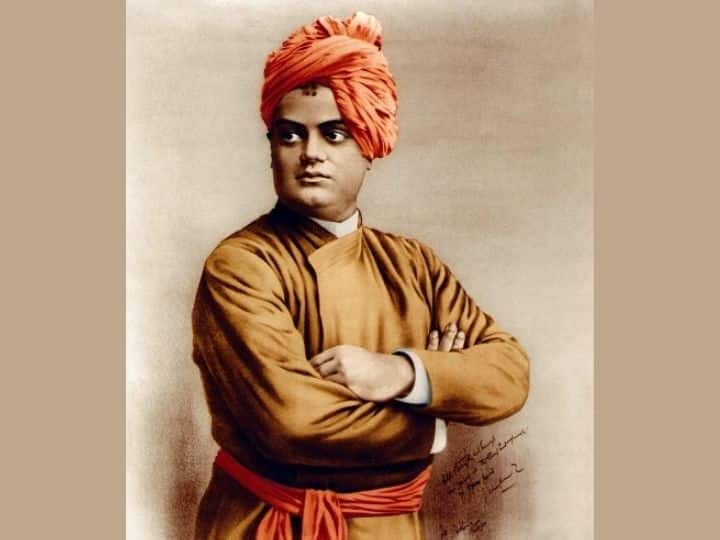
New Delhi: Swami Vivekananda, then an unknown monk from India, captivated the American audience when he shared his spiritual insight at the World Parliament of Religions held in Chicago in 1893.
Appearing as a spokesman for Hinduism, he left the assembly spellbound. A newspaper account reportedly described him as “an orator by divine right and undoubtedly the greatest figure at the Parliament,” according to Britannica.
Swami Vivekananda’s Chicago speeches, it is believed, ushered in a new era in the understanding of Indian religious thoughts in the West.
He began his first speech with “Sisters and brothers of America”, making the words immortal as they remained etched in the memory of the listeners and still has a “thrilling effect on the readers even after more than 125 years”, Belur Math, the headquarters of Ramakrishna Mission that Swami Vivekananda founded after returning to India, says on its website.
He delivered a total of six speeches at the conference that started on September 11 and concluded on September 27.
On his birth anniversary, here is a look back at some of the most memorable quotes from his 1893 Chicago speeches.
1. “I am proud to belong to a religion which has taught the world both tolerance and universal acceptance. We believe not only in universal toleration, but we accept all religions as true. I am proud to belong to a nation which has sheltered the persecuted and the refugees of all religions and all nations of the earth.”
2. “Sectarianism, bigotry, and its horrible descendant, fanaticism, have long possessed this beautiful earth. They have filled the earth with violence, drenched it often and often with human blood, destroyed civilization, and sent whole nations to despair. Had it not been for these horrible demons, human society would be far more advanced than it is now.”
3. “The Vedas teach us that creation is without beginning or end. Science is said to have proved that the sum total of cosmic energy is always the same. Then, if there was a time when nothing existed, where was all this manifested energy? Some say it was in a potential form in God. In that case God is sometimes potential and sometimes kinetic, which would make Him mutable. Everything mutable is a compound, and everything compound must undergo that change which is called destruction. So God would die, which is absurd. Therefore there never was a time when there was no creation.”
4. “...creation and creator are two lines, without beginning and without end, running parallel to each other. God is the ever active providence, by whose power systems after systems are being evolved out of chaos, made to run for a time, and again destroyed.”
5. “The Vedas teach that the soul is divine, only held in the bondage of matter; perfection will be reached when this bond will burst, and the word they use for it is therefore, Mukti — freedom, freedom from the bonds of imperfection, freedom from death and misery.”
6. "The Hindus have their faults, they sometimes have their exceptions; but mark this, they are always for punishing their own bodies, and never for cutting the throats of their neighbours."
7. “It is an insult to a starving people to offer them religion; it is an insult to a starving man to teach him metaphysics. In India a priest that preached for money would lose caste and be spat upon by the people.”
8. “In religion there is no caste; caste is simply a social institution.”
9. “We cannot deny that bodies acquire certain tendencies from heredity, but those tendencies only mean the physical configuration, through which a peculiar mind alone can act in a peculiar way. There are other tendencies peculiar to a soul caused by his past actions.”
10. “...if anybody dreams of the exclusive survival of his own religion and the destruction of the others, I pity him from the bottom of my heart, and point out to him that upon the banner of every religion will soon be written, in spite of resistance: ‘Help and not Fight’, ‘Assimilation and not Destruction’, ‘Harmony and Peace and not Dissension’.”
(Source: Belurmath.org)

Top Headline
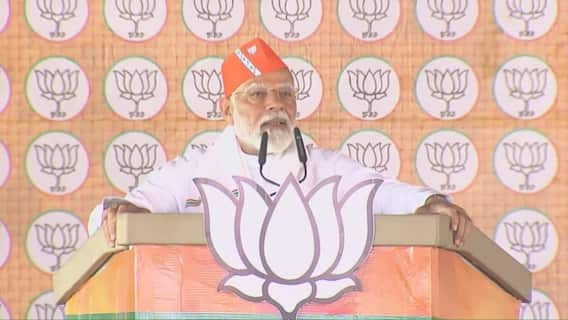
Trending News

Photogallery
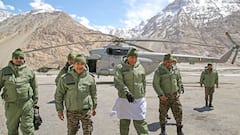
Trending Opinion
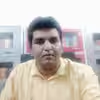
Personal Corner
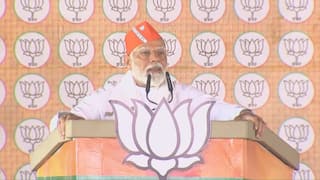
TYRE PARTNER

Swami Vivekananda's Chicago Speech: Read the Full Text Here
Edited By: Sanchari Chatterjee
Last Updated: September 11, 2017, 14:40 IST

File photo of Swami Vivekananda. (Source: Wikicommons)
On Monday, Prime Minister Narendra Modi commemorated the 125th anniversary of the famous speech that took India to a global platform.
New Delhi: Before September 11 was made famous by the terror attacks on the United States, this date was known for a completely different cause. This was the date when Swami Vivekananda delivered his 1893 speech in Chicago. On Monday, Prime Minister Narendra Modi observed the 125th anniversary of the famous speech that took India to a global platform.
Here’s the full text of Swami Vivekananda’s Chicago speech in which he introduced Hinduism to the world:
Sisters and Brothers of America
It fills my heart with joy unspeakable to rise in response to the warm and cordial welcome which you have given us. l thank you in the name of the most ancient order of monks in the world; I thank you in the name of the mother of religions; and I thank you in the name of the millions and millions of Hindu people of all classes and sects. My thanks, also, to some of the speakers on this platform who, referring to the delegates from the Orient, have told you that these men from far-off nations may well claim the honor of bearing to different lands the idea of toleration. I am proud to belong to a religion which has taught the world both tolerance and universal acceptance. We believe not only in universal toleration, but we accept all religions as true. I am proud to belong to a nation which has sheltered the persecuted and the refugees of all religions and all nations of the earth. I am proud to tell you that we have gathered in our bosom the purest remnant of the Israelites, who came to the southern India and took refuge with us in the very year in which their holy temple was shattered to pieces by Roman tyranny. I am proud to belong to the religion which has sheltered and is still fostering the remnant of the grand Zoroastrian nation. I will quote to you, brethren, a few lines from a hymn which I remember to have repeated from my earliest boyhood, which is every day repeated by millions of human beings:
As the different streams having there sources in different places all mingle their water in the sea, so, O Lord, the different paths which men take through different tendencies, various though they appear, crooked or straight, all lead to thee.
The present convention, which is one of the most august assemblies ever held, is in itself a vindication, a declaration to the world, of the wonderful doctrine preached in the Gita:
Whosoever comes to Me, through whatsoever form, I reach him; all men are struggling through paths which in the end lead to me.
Sectarianism, bigotry, and its horrible descendant, fanaticism, have long possessed this beautiful earth. They have filled the earth with violence, drenched it often and often with human blood, destroyed civilization, and sent whole nations to despair. Had it not been for these horrible demons, human society would be far more advanced than it is now. But their time is come; and I fervently hope that the bell that tolled this morning in honor of this convention may be the death-knell of all fanaticism, of all persecutions with the sword or with the pen, and of all uncharitable feelings between persons wending their way to the same goal.
Concluding Address — Chicago, September 27, 1893
The World’s Parliament of Religions has become an accomplished fact, and the merciful Father has helped those who labored to bring it into existence, and crowned with success their most unselfish labor.My thanks to those noble souls whose large hearts and love of truth first dreamed this wonderful dream and then realized it. My thanks to the shower of liberal sentiments that has overflowed this platform. My thanks to this enlightened audience for their uniform kindness to me and for their appreciation of every thought that tends to smooth the friction of religions. A few jarring notes were heard from time to time in this harmony. My special thanks to them, for they have, by their striking contrast, made general harmony the sweeter.
Much has been said of the common ground of religious unity. I am not going just now to venture my own theory. But if anyone here hopes that this unity will come by the triumph of any one of the religions and the destruction of the others, to him I say, “Brother, yours is an impossible hope.” Do I wish that the Christian would become Hindu? God forbid. Do I wish that the Hindu or Buddhist would become Christian? God forbid.
The seed is put in the ground, and earth and air and water are placed around it. Does the seed become the earth, or the air, or the water? No. It becomes a plant. It develops after the law of its own growth, assimilates the air, the earth, and the water, converts them into plant substance, and grows into a plant.
Similar is the case with religion. The Christian is not to become a Hindu or a Buddhist, nor a Hindu or a Buddhist to become a Christian. But each must assimilate the spirit of the others and yet preserve his individuality and grow according to his own law of growth.
If the Parliament of Religions has shown anything to the world, it is this: It has proved to the world that holiness, purity and charity are not the exclusive possessions of any church in the world, and that every system has produced men and women of the most exalted character.
In the face of this evidence, if anybody dreams of the exclusive survival of his own religion and the destruction of the others, I pity him from the bottom of my heart, and point out to him that upon the banner of every religion will soon be written in spite of resistance: “Help and not fight,” “Assimilation and not Destruction,” “Harmony and Peace and not Dissension.”
Read all the Latest News , Breaking News and Coronavirus News here
- Chicago speech
- modi speech
- prime minister narendra modi
- Swami Vivekananda
- swami vivekananda address US
- Swami Vivekananda Chicago speech
- swami vivekananda hinduism

130 years of Swami Vivekananda's iconic Chicago speech that put Hinduism on world map
S wami Vivekananda's iconic speech on Hinduism was delivered at the Parliament of the World's Religions in Chicago on September 11, 1893. This historic address marked his introduction of Hinduism and Indian spirituality to the Western world. Vivekananda began his speech with the famous words, "Sisters and brothers of America," which captivated the audience and set the tone for his message of universal brotherhood and religious tolerance. Here is an excerpt from his speech:
"Sisters and Brothers of America,
It fills my heart with joy unspeakable to rise in response to the warm and cordial welcome which you have given us. I thank you in the name of the most ancient order of monks in the world; I thank you in the name of the mother of religions, and I thank you in the name of millions and millions of Hindu people of all classes and sects."
Vivekananda went on to speak about the importance of tolerance and acceptance of different religious beliefs and emphasized the idea that all religions ultimately lead to the same truth. He also talked about the need for a harmonious coexistence of different faiths and the importance of recognizing the divinity within each individual.
Here are 9 best lines from his iconic speech:
- "I am proud to belong to a religion which has taught the world both tolerance and universal acceptance."
- "We believe not only in universal toleration but we accept all religions as true."
- "The present convention, which is one of the most august assemblies ever held, is in itself a vindication, a declaration to the world of the wonderful doctrine preached in the Gita: 'Whosoever comes to Me, through whatsoever form, I reach him; all men are struggling through paths which in the end lead to Me.'"
- "If the Parliament of Religions has shown anything to the world, it is this: It has proved to the world that holiness, purity, and charity are not the exclusive possessions of any church in the world, and that every system has produced men and women of the most exalted character."
- "Sectarianism, bigotry, and its horrible descendant, fanaticism, have long possessed this beautiful earth. They have filled the earth with violence, drenched it often and often with human blood, destroyed civilization and sent whole nations to despair."
- "I fervently hope that the bell that tolled this morning in honor of this convention may be the death-knell of all fanaticism, of all persecutions with the sword or with the pen, and of all uncharitable feelings between persons wending their way to the same goal."
- "The Christian is not to become a Hindu or a Buddhist, nor a Hindu or a Buddhist to become a Christian. But each must assimilate the spirit of the others and yet preserve his individuality and grow according to his own law of growth."
- "As the different streams having their sources in different places all mingle their water in the sea, so, O Lord, the different paths which men take through different tendencies, various though they appear, crooked or straight, all lead to Thee."
- "Let us preach the ideal, and let us not quarrel over the non-essential."
For more news like this visit TOI . Get all the Latest News , City News , India News , Business News , and Sports News . For Entertainment News , TV News , and Lifestyle Tips visit Etimes
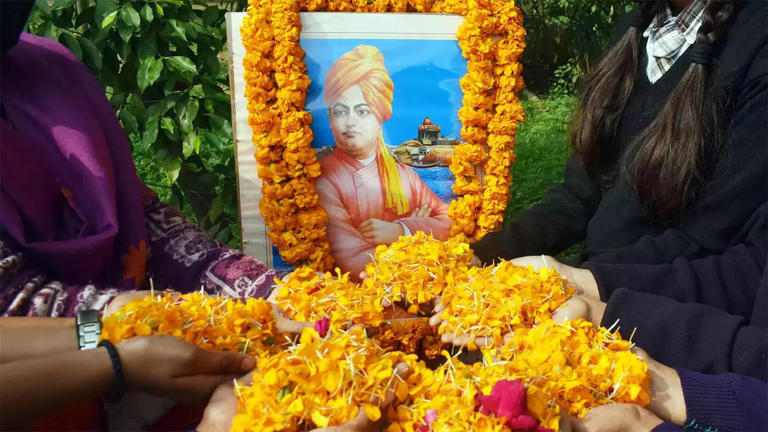

COMMENTS
11-27 September 1893: Swami Vivekananda Delivers his First Speech in the Parliament of the World's Religions in ChicagoAt the World's Parliament of Religions...
Swami Vivekananda (1863-1902) is best known in the United States for his groundbreaking speech to the 1893 World's Parliament of Religions in which he introduced Hinduism to America and called for religious tolerance and an end to fanaticism. Born Narendranath Dutta, he was the chief disciple of the 19th-century mystic Ramakrishna and the ...
On Swami Vivekananda's 149th birth anniversary, here's the full text of his famous Chicago speech through which he introduced Hinduism at the Parliament of the World's Religions, Chicago in 1893. 11th September, 1893. Sisters and Brothers of America. It fills my heart with joy unspeakable to rise in response to the warm and cordial welcome ...
This speech was given by Swami Vivekananda at Parliament of World's Religions, Chicago on 11th of September 1893. Sisters and Brothers of America, It fills my heart with . . Chicago Speech 11 September 1893 ... — Swami Vivekananda (@vivekexpress) September 11, 2021.
"Religion not the crying need of India" was a lecture delivered by Indian Hindu monk Swami Vivekananda on 20 September 1893 at the Parliament of the World's Religions, Chicago. In the lecture, Vivekananda criticized Christian missionaries for ignoring the needs of starving people in India. He said that Indians did not need any religious education, as there was already a surfeit of religion in ...
While Swami Vivekananda's introductory speech at the World Parliament of Religions on September 11, 1893 is widely regarded as iconic, we note that, contrary to popular opinion, he did not advocate the idea of a 'universal religion', but championed the concept of a common goal or destiny (i.e., human salvation) for every religious community.
On his 117th death anniversary, ThePrint brings you the full text of Swami Vivekananda's speech in Chicago on 11 September 1893 that put Hinduism on an international platform. ***********************. isters and brothers of America, It fills my heart with joy unspeakable to rise in response to the warm and cordial welcome which you have given us.
September 11, 2019 marks the 126th anniversary of Swami Vivekananda's historic speech at the World Parliament of Religions in Chicago. On this day in 1893, t...
Swami Vivekananda, in his speech, made a powerful statement. He said, "Sectarianism, bigotry, and its horrible descendant, fanaticism, have long possessed this beautiful earth. They have filled the earth with violence, drenched it often and often with human blood, destroyed civilization, and sent whole nations to despair. ...
Subhamoy Das. Updated on June 25, 2019. Swami Vivekananda was a Hindu monk from India known for introducing many in the U.S. and Europe to Hinduism in the 1890s. His speeches at the World Parliament of Religions of 1893 offer an overview of his faith and a call for unity between the world's major religions.
Since it was first delivered, Swamiji's iconic "Response to Welcome" speech on September 11, 1893, at the Parliament of Religions in Chicago has been read, re-read, dissected, analyzed, and its every word scrutinized ad infinitum. Most people who were involved in these activities sought out the first volume of the Complete Works of Swami ...
SWAMI VIVEKANANDA'S SPEECH AT WORLD PARLIAMENT OF RELIGION, CHICAGO. RESPONSE TO WELCOME. Sisters and Brothers of America, It fills my heart with joy unspeakable to rise in response to the warm and cordial welcome which you have given us. I thank you in the name of the most ancient order of monks in the world; I thank you in the name of the ...
SWAMI VIVEKANANDA's opening address to the World's Parliament of Religions, Chicago, USA, 11 September, 1893. Sisters and Brothers of America, it fills my heart with joy unspeakable to rise in response to the warm and cordial welcome which you have given us. I thank you in the name of the most ancient order of monks in the world; I thank ...
In the first of six speeches that he made over the course of September, Swami Vivekananda propounded the notion of a universal religion, emphasising the fundamental oneness behind all faiths. Decrying mankind's tendency to herald the superiority of one's own religion over others, the saint urged followers of various faiths to hold true to the ...
Chicago Conference Speech: What Swami Vivekananda Said and Why it is Important for Students and Young Leaders. Swami Vivekanda delivred a speech for which he had received a standing ovation for 2 minutes at the Chicago Convention of Parliament of Religions. India continues to be the country that has harbored refugees.
The currently available published version of his speech on 11 Sep. 1893 does not have one line which was found in the original published version of the official bodies of Parliament of Religions as well as the book published by Sri G. Natesan Iyer from Madras during the lifetime of Swami Vivekananda.
Frank Parlato Jr. is a Vedic scholar, one of the leading authorities in the world on the life and teachings of Swami Vivekananda. His work is cited and has been published in prestigious journals and magazines around the world, including Encyclopedia.com, Vedanta Kesari and Hinduism Today. His research has lead to many new discoveries of Vivekananda considered by hundreds of millions as the ...
Hindu-Christian Studies Bulletin 6 (1993) 1-3. Vivekananda's visit to the Chicago parlia ment to see what light his statements might shed on issues of religious harmony or plu ralism. Vivekananda addressed the Assembly on six different occasions in 1893, the re sponse to the welcome on September 11, 'Why We Disagree' on September 13, the paper ...
Swami Vivekananda Speech in Chicago: Swami Vivekananda's teachings and philosophy are still very much relevant today because they stressed on different aspects of religion, youth, education, faith, character building as well as social issues. One of his most iconic speeches came at the World's Parliament of Religions in Chicago in 1893, where ...
Short Speech On Swami Vivekananda. Swami Vivekananda was well renowned for having a positive outlook on life. He is credited with bringing new beginnings to 19th-century India. He is a great soul and human being. On January 12, 1863, he was born and was among the Datta family's nine children. Swami Vivekananda was raised in a distinguished ...
Swami Vivekananda's Chicago speeches, it is believed, ushered in a new era in the understanding of Indian religious thoughts in the West. He began his first speech with "Sisters and brothers of America", making the words immortal as they remained etched in the memory of the listeners and still has a "thrilling effect on the readers even ...
This was the date when Swami Vivekananda delivered his 1893 speech in Chicago. On Monday, Prime Minister Narendra Modi observed the 125th anniversary of the famous speech that took India to a global platform. Here's the full text of Swami Vivekananda's Chicago speech in which he introduced Hinduism to the world: Sisters and Brothers of America
Swami Vivekananda delivered a historic speech at the Parliament of the World's Religions in 1893, introducing Hinduism and Indian spirituality to the Western world. He emphasized the importance of ...